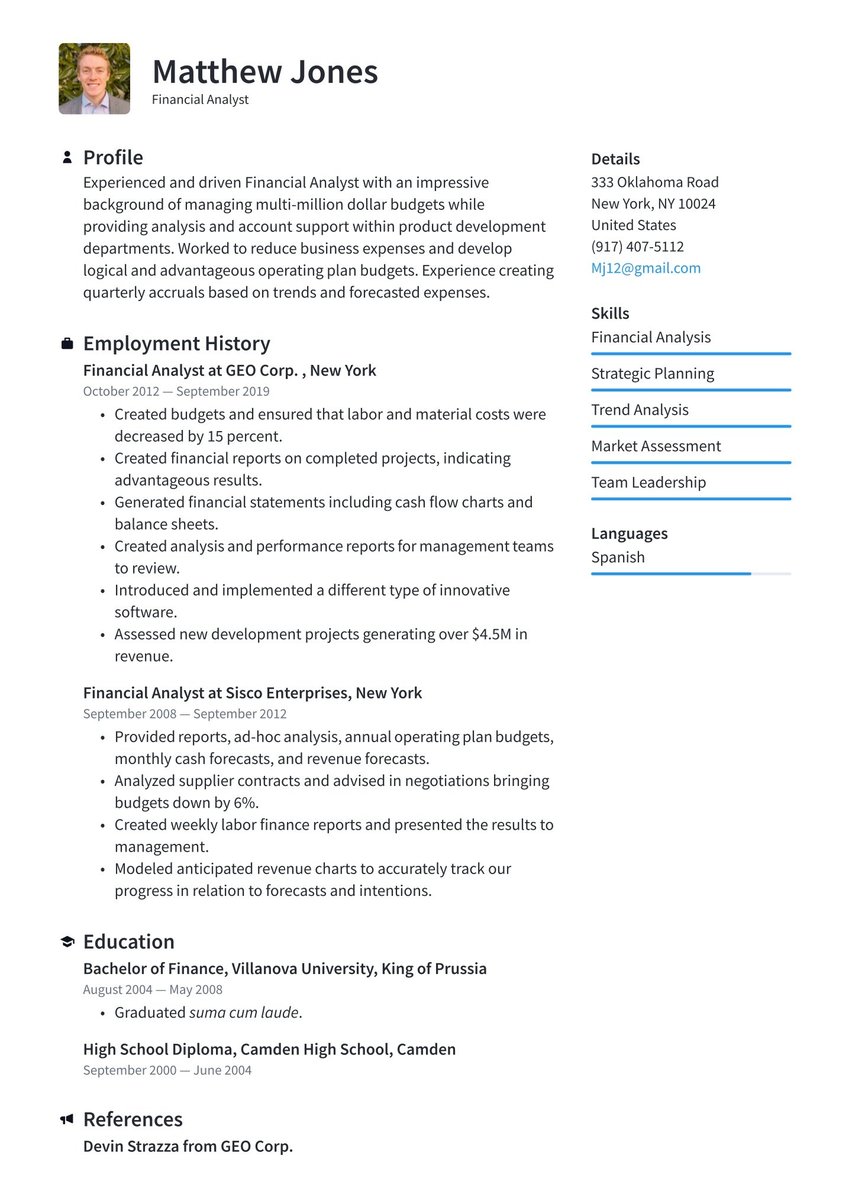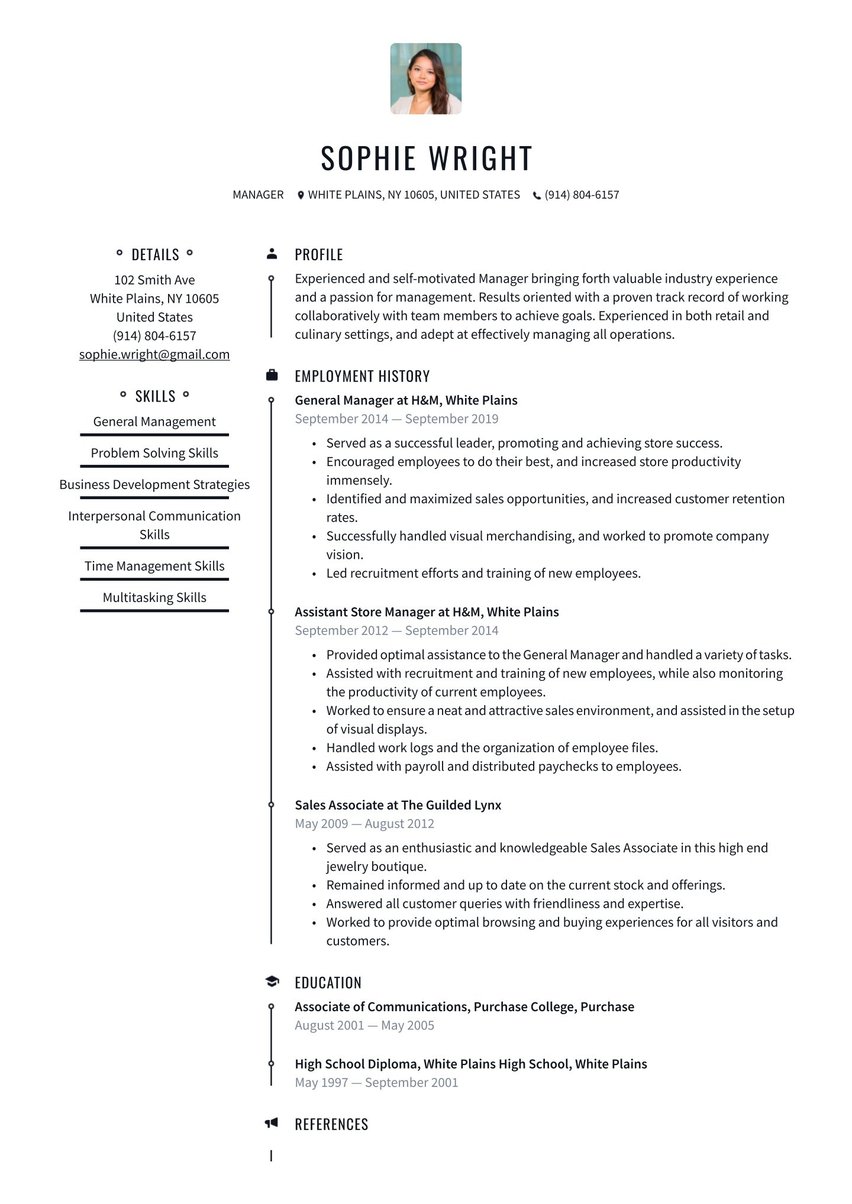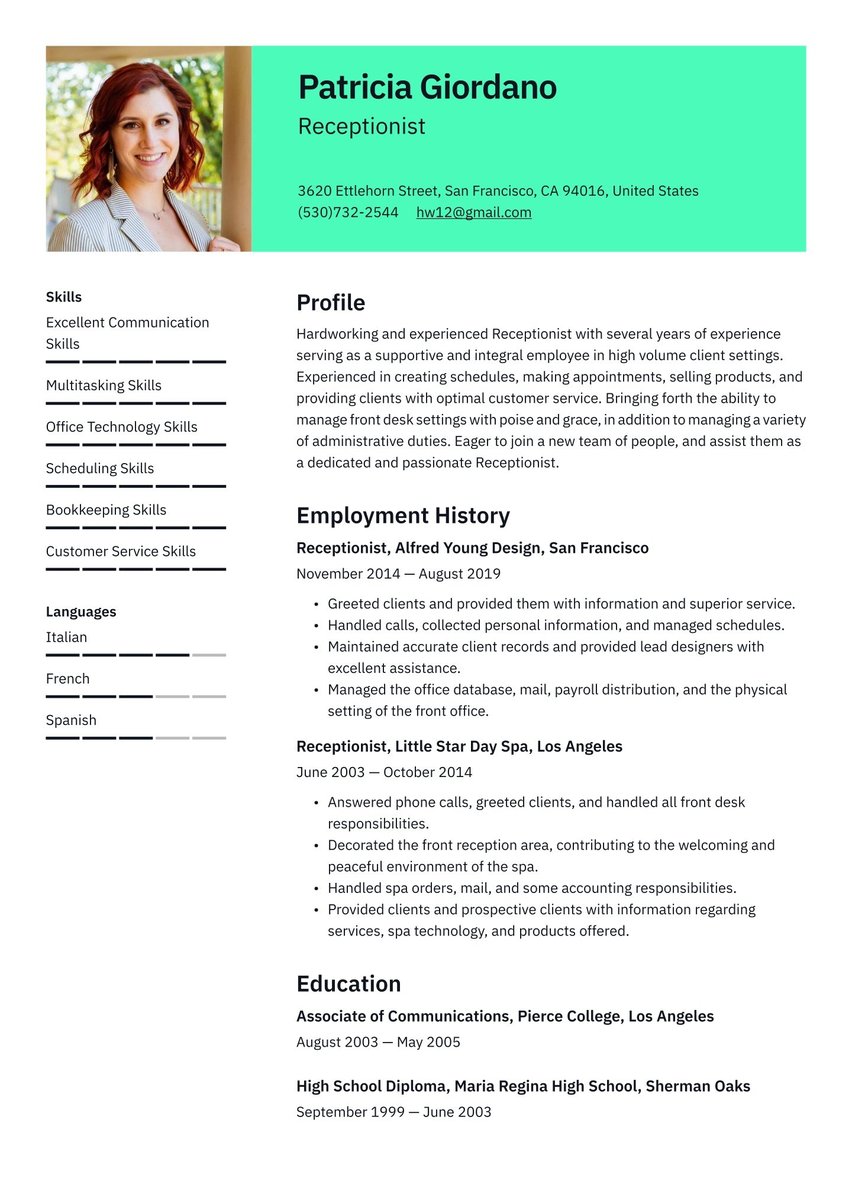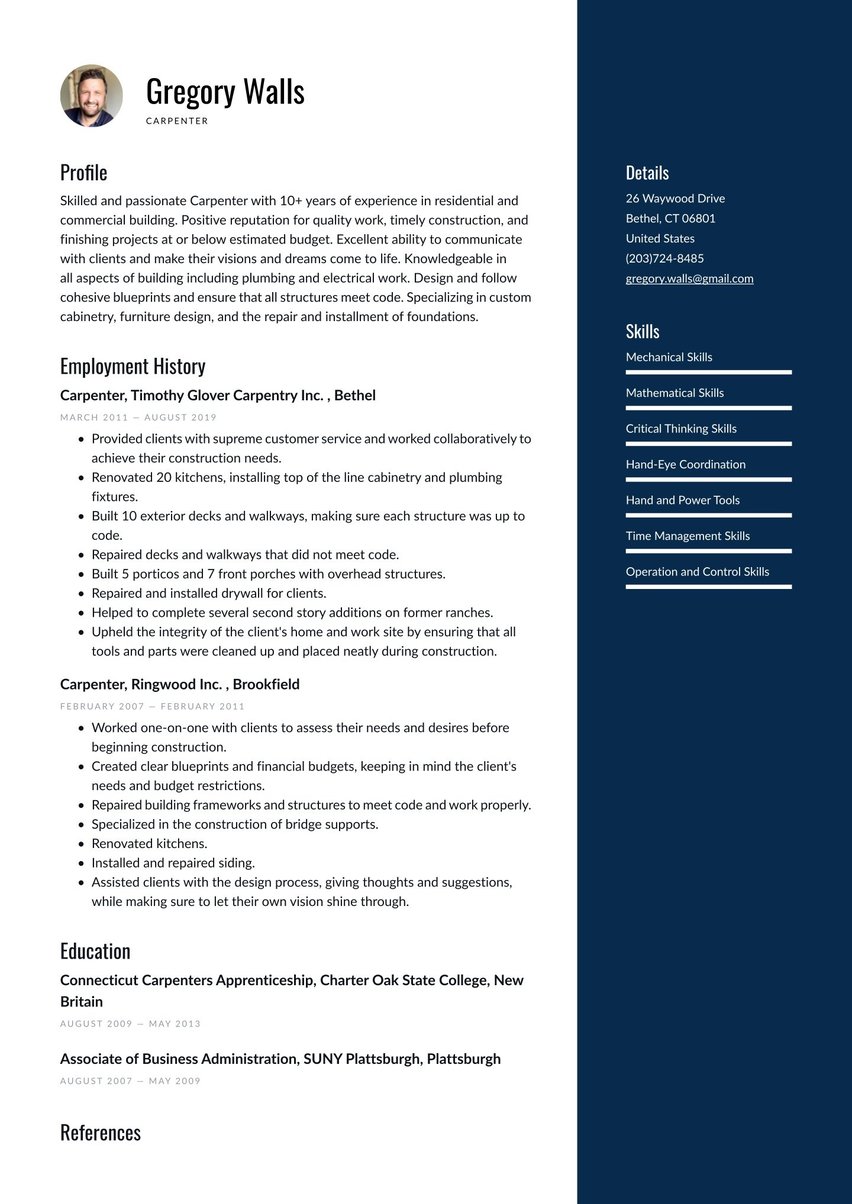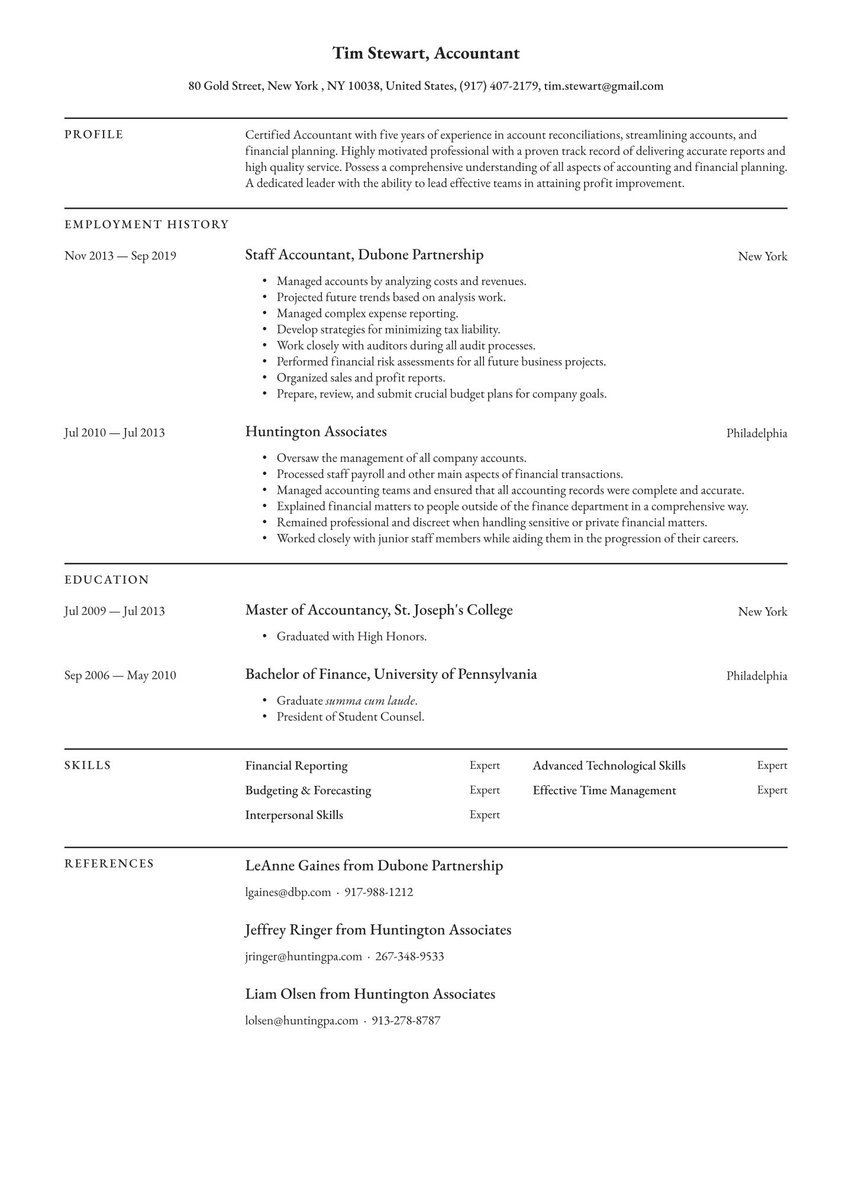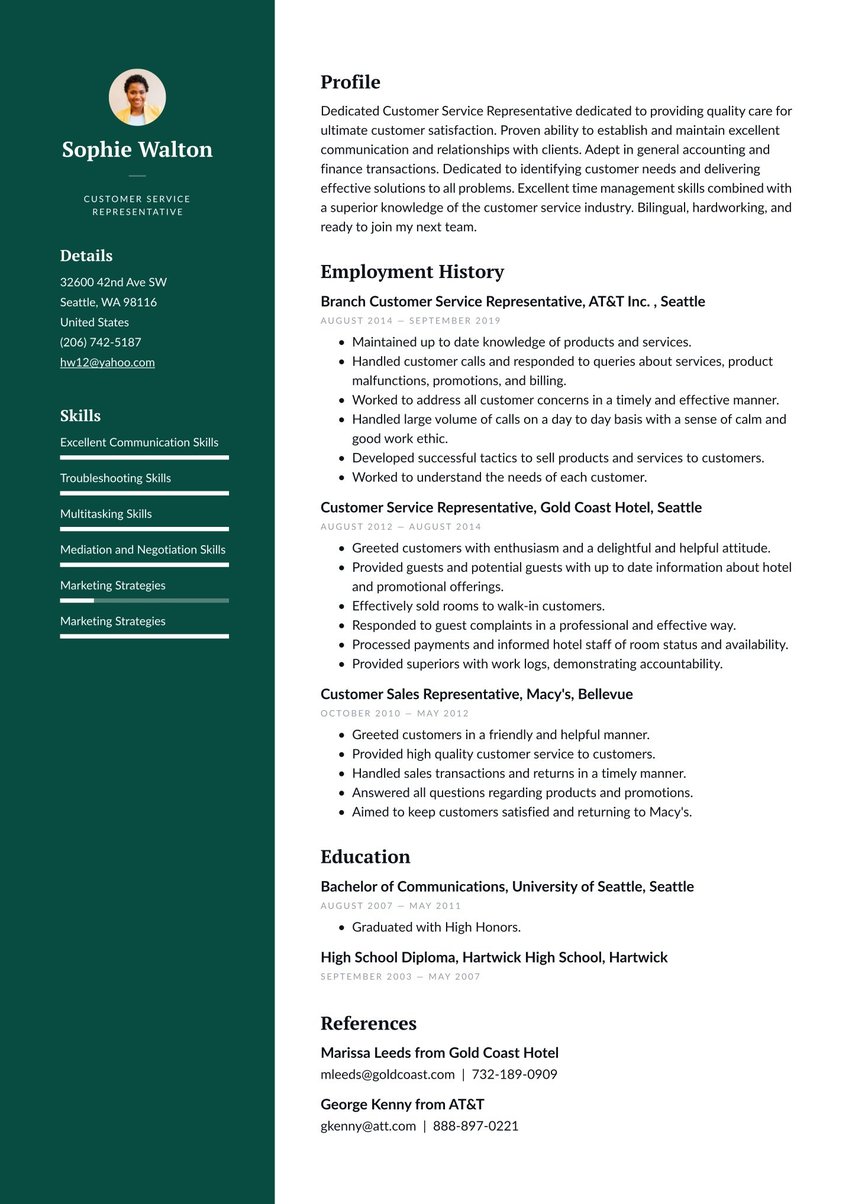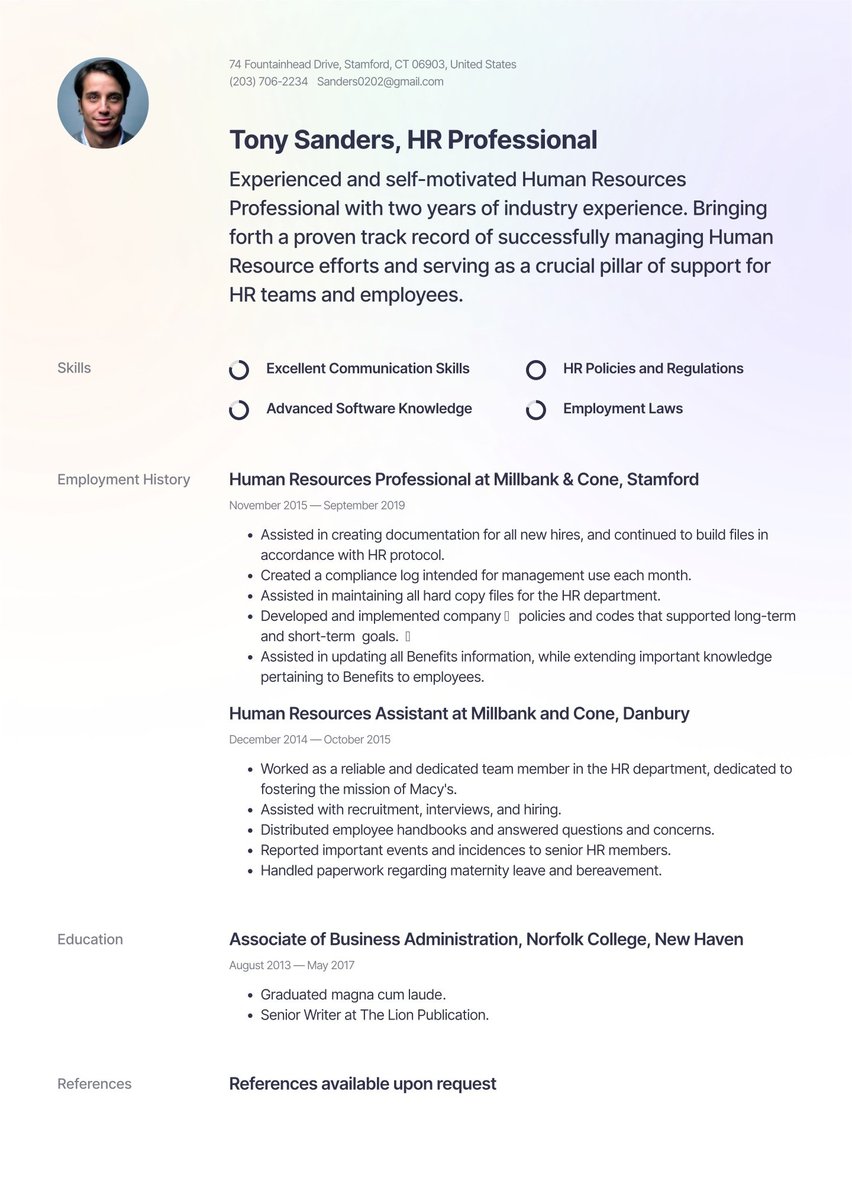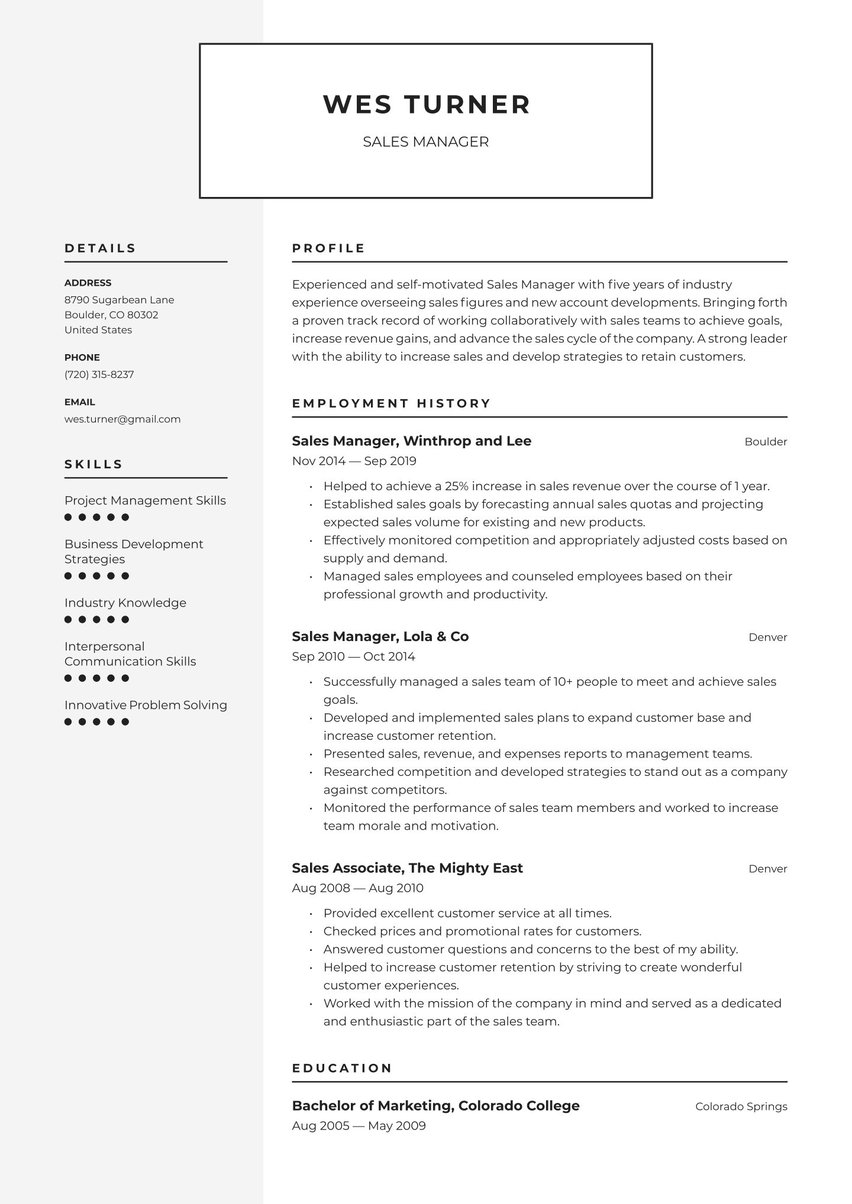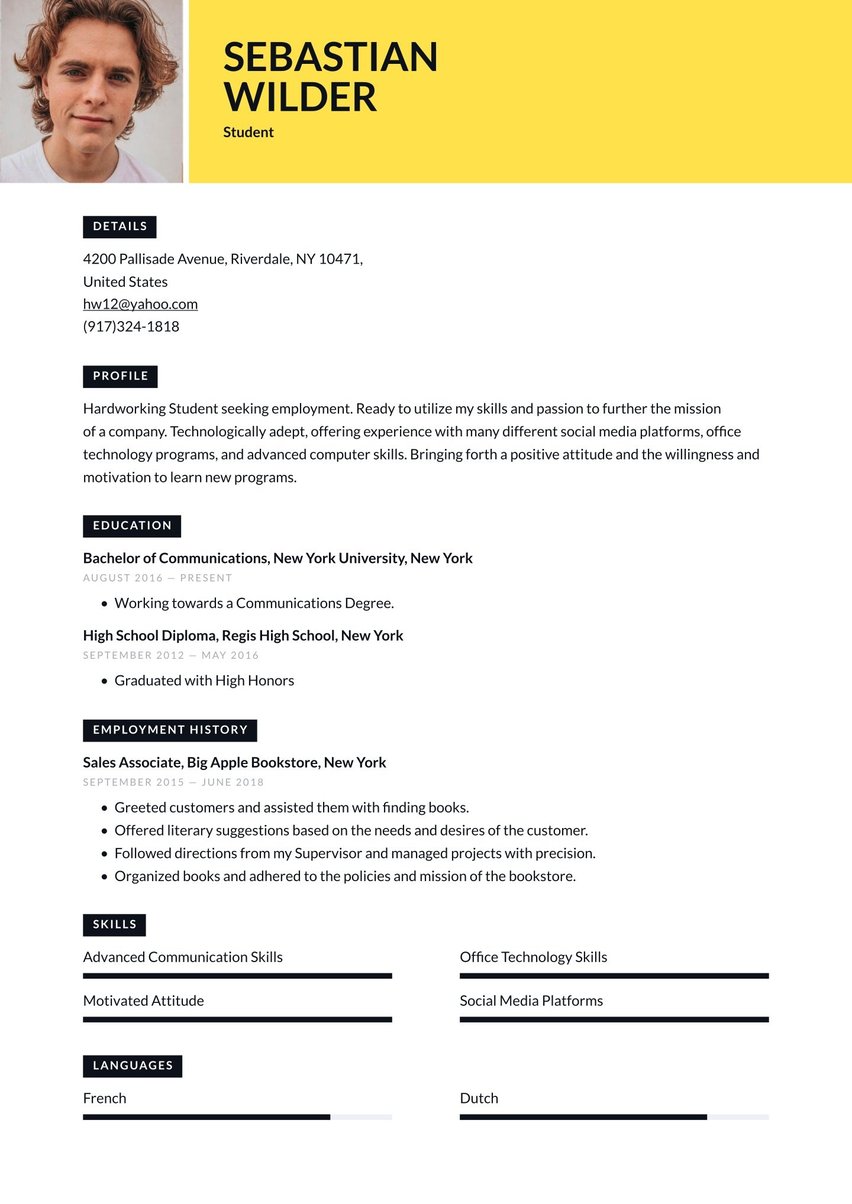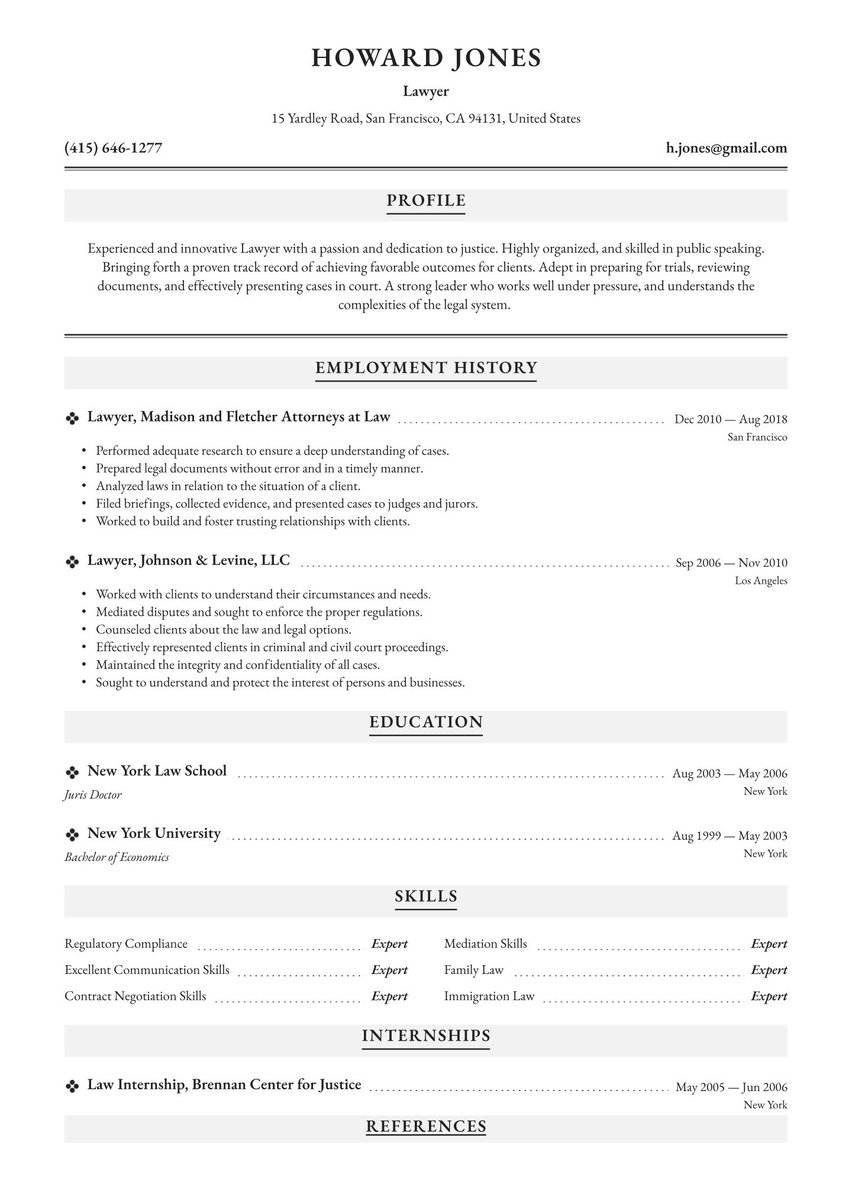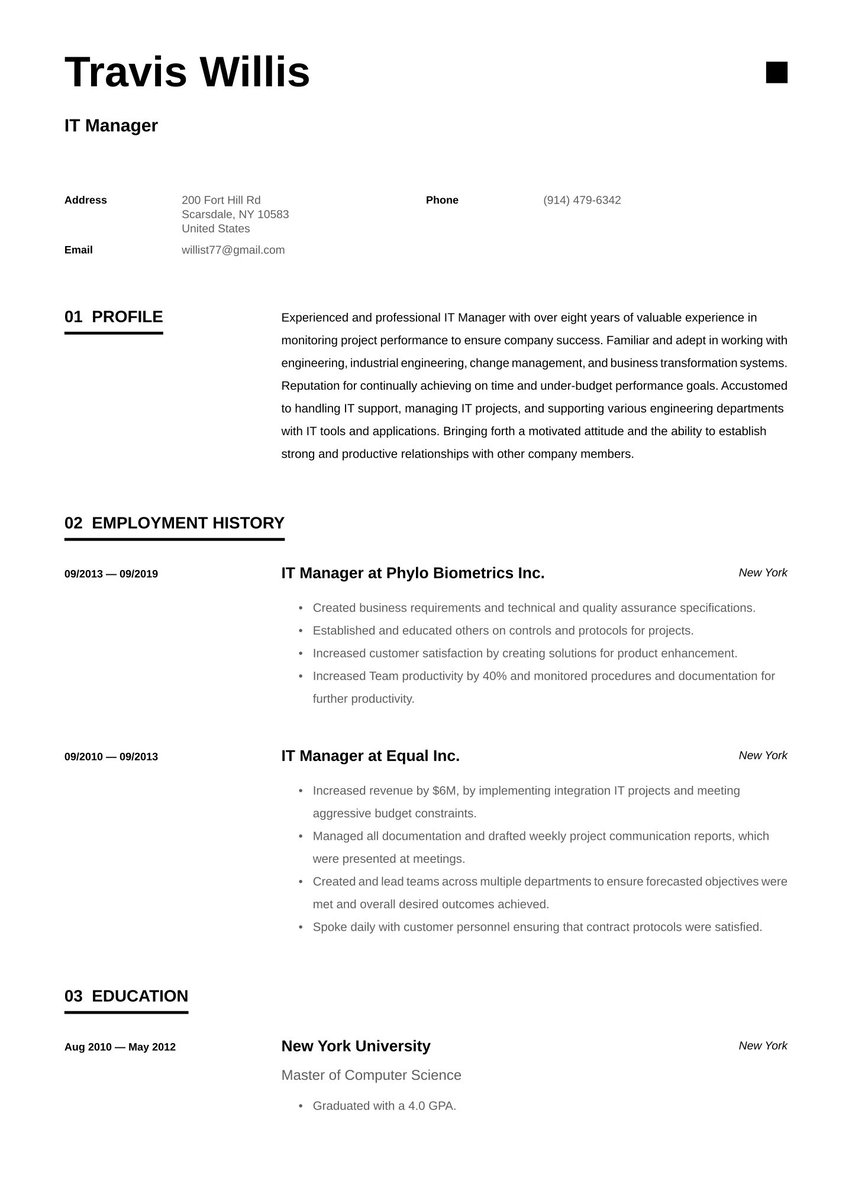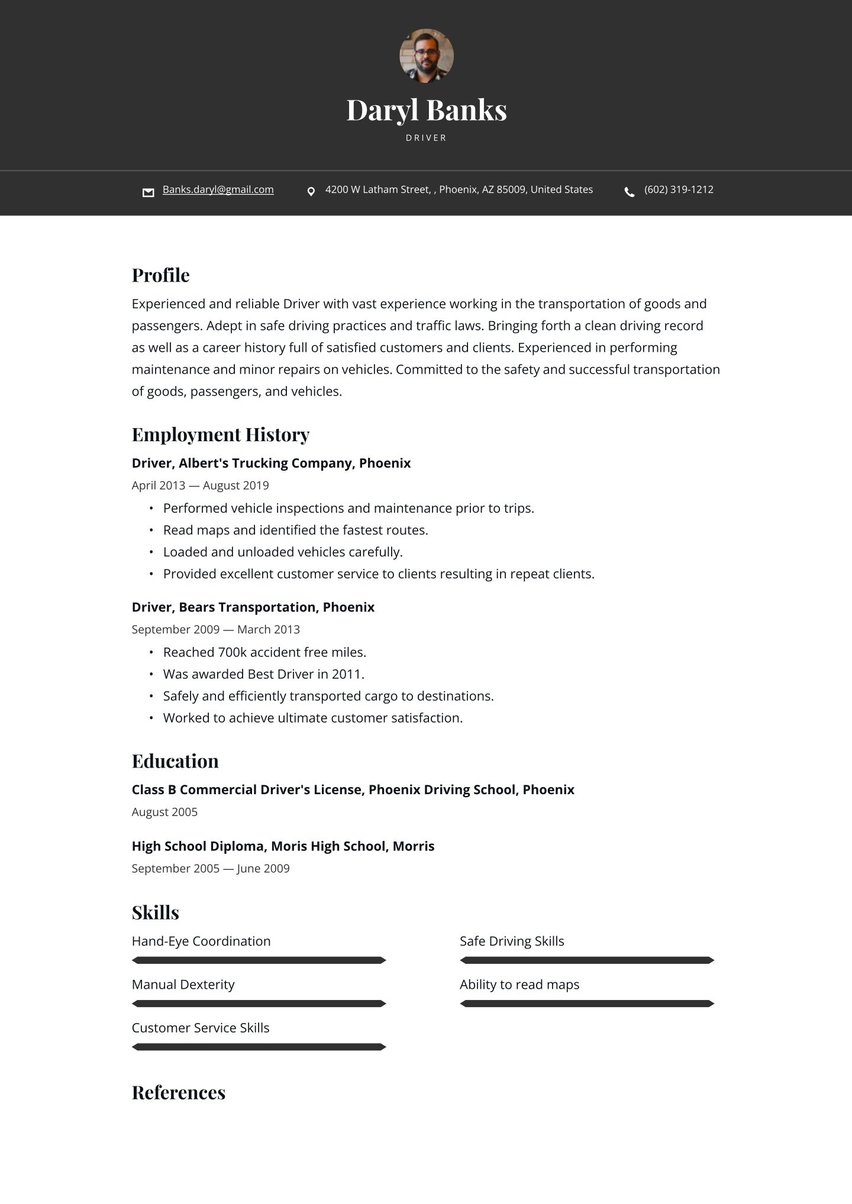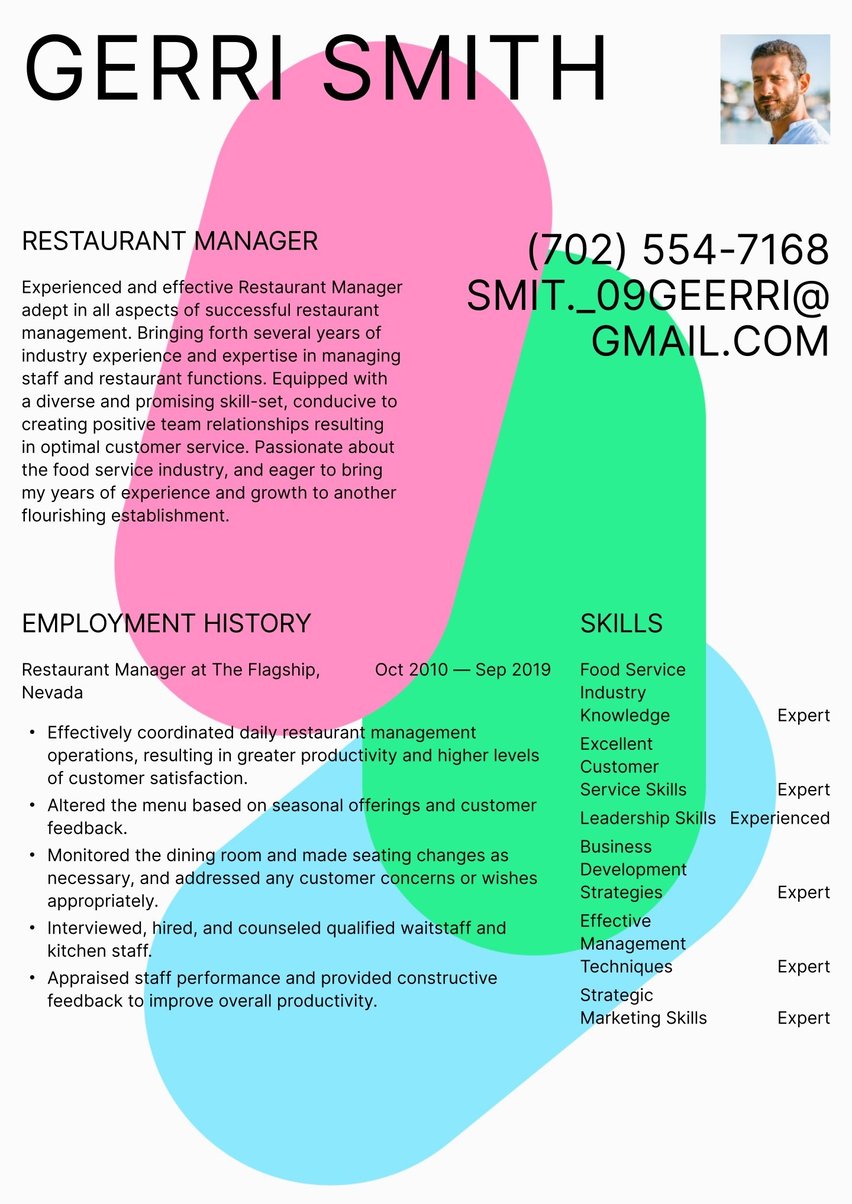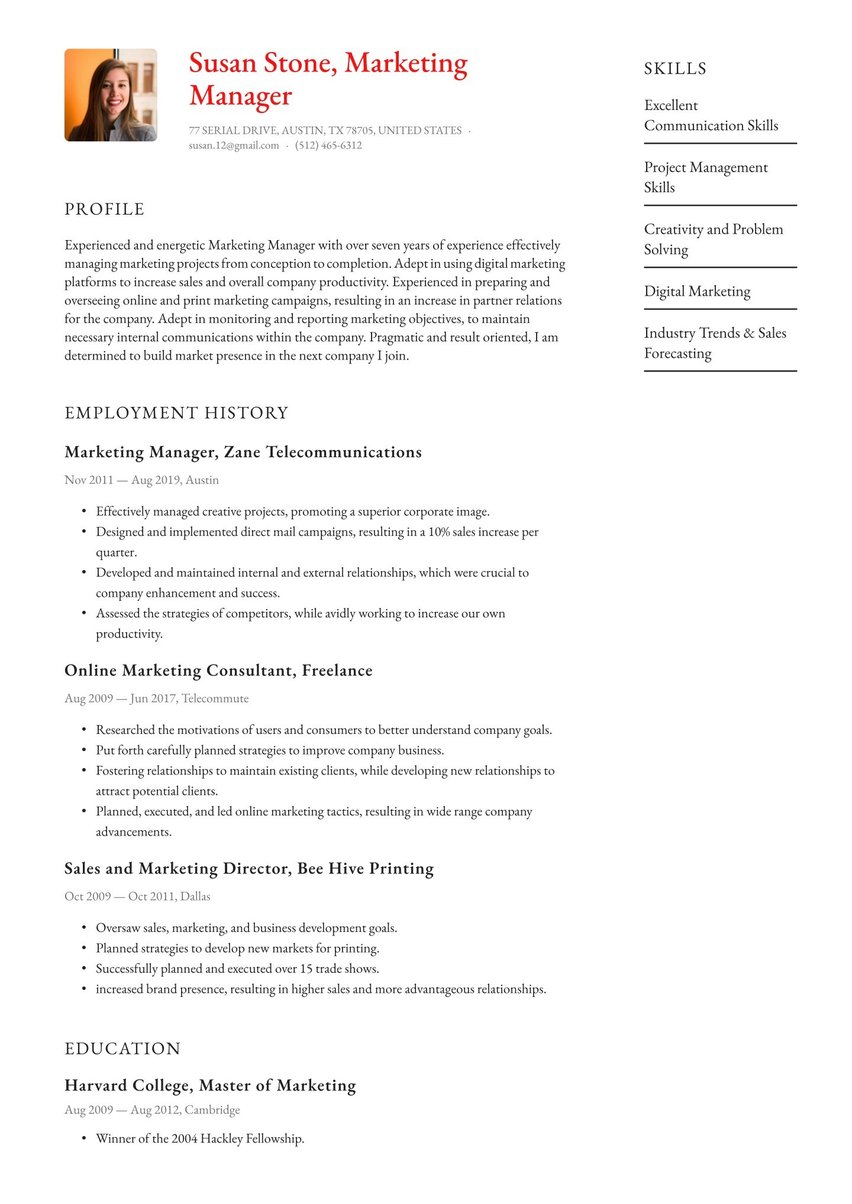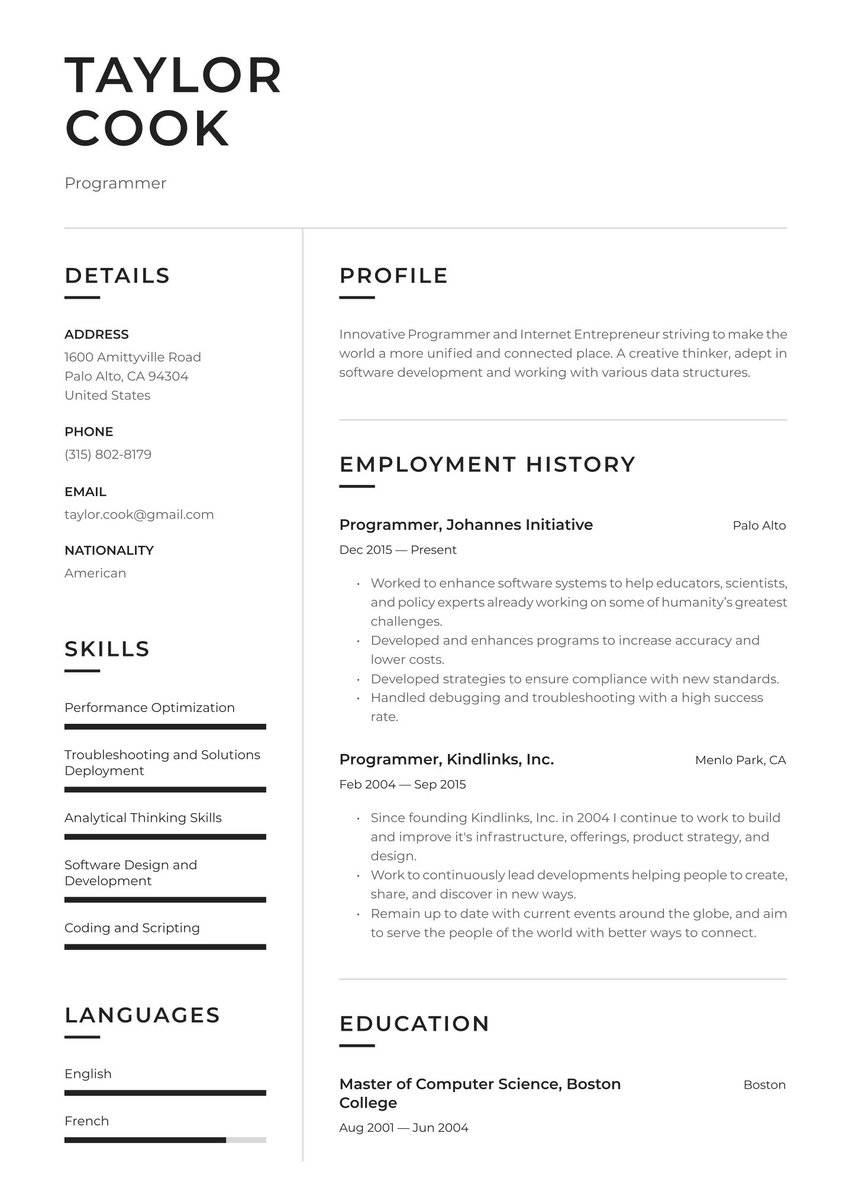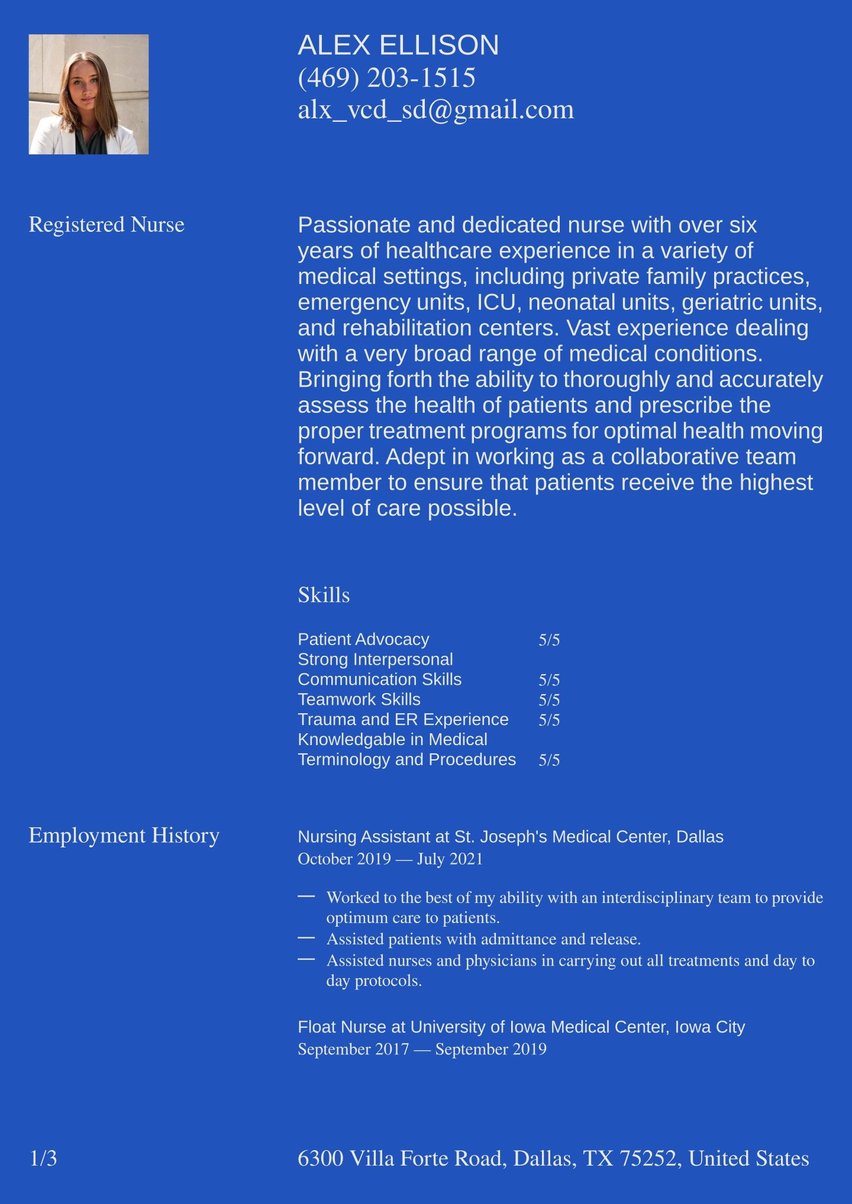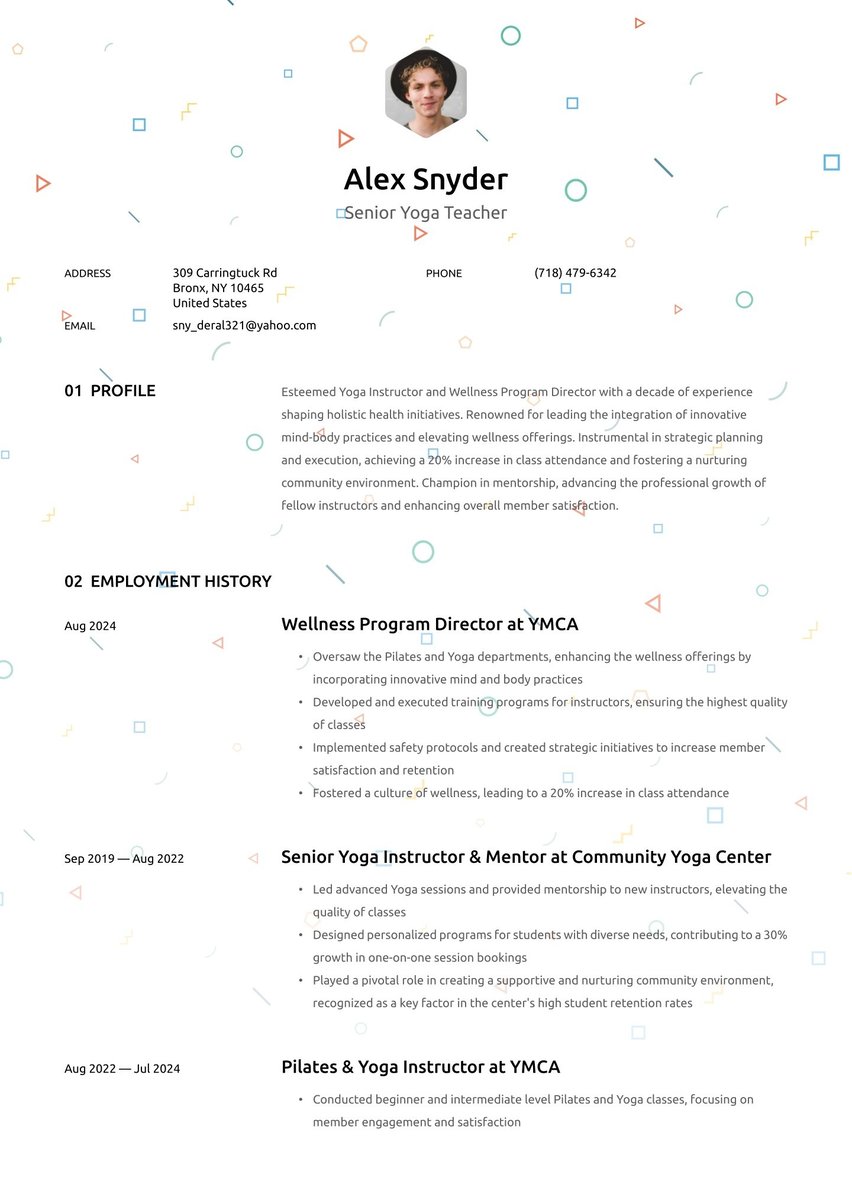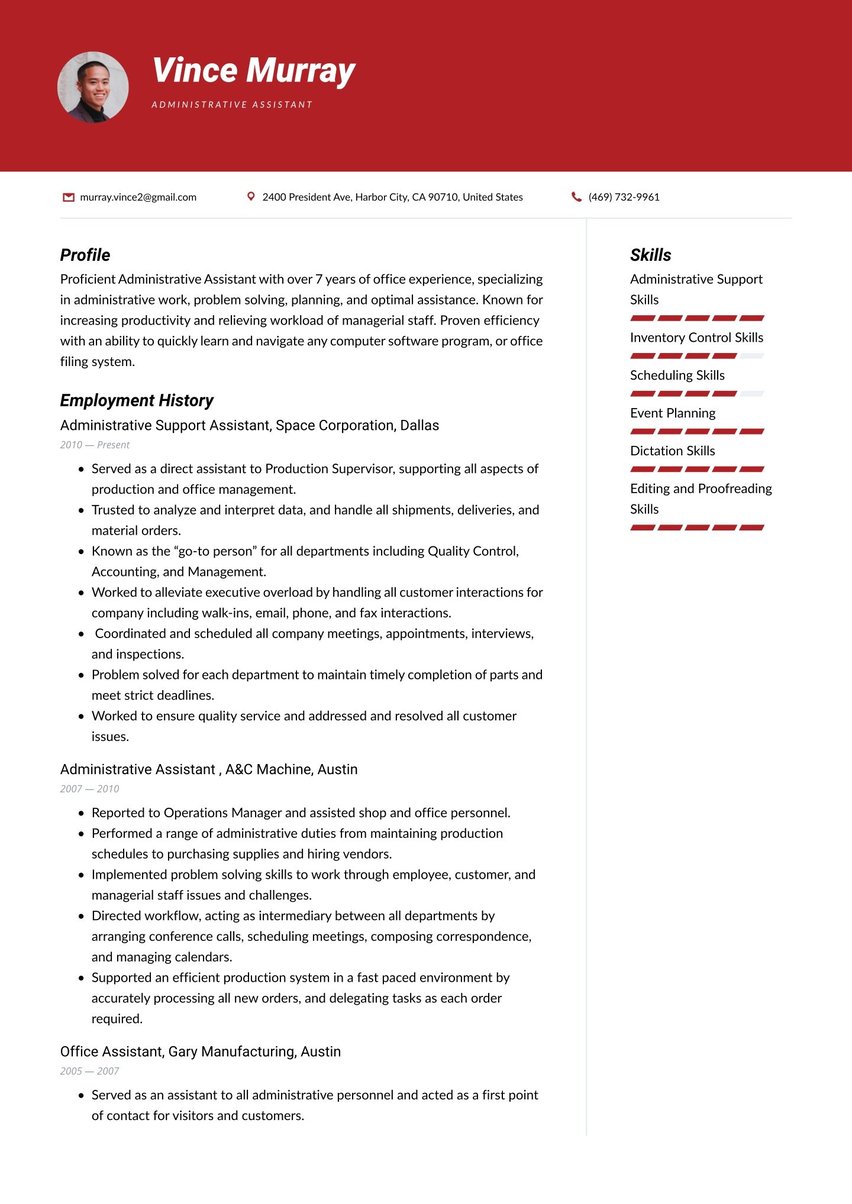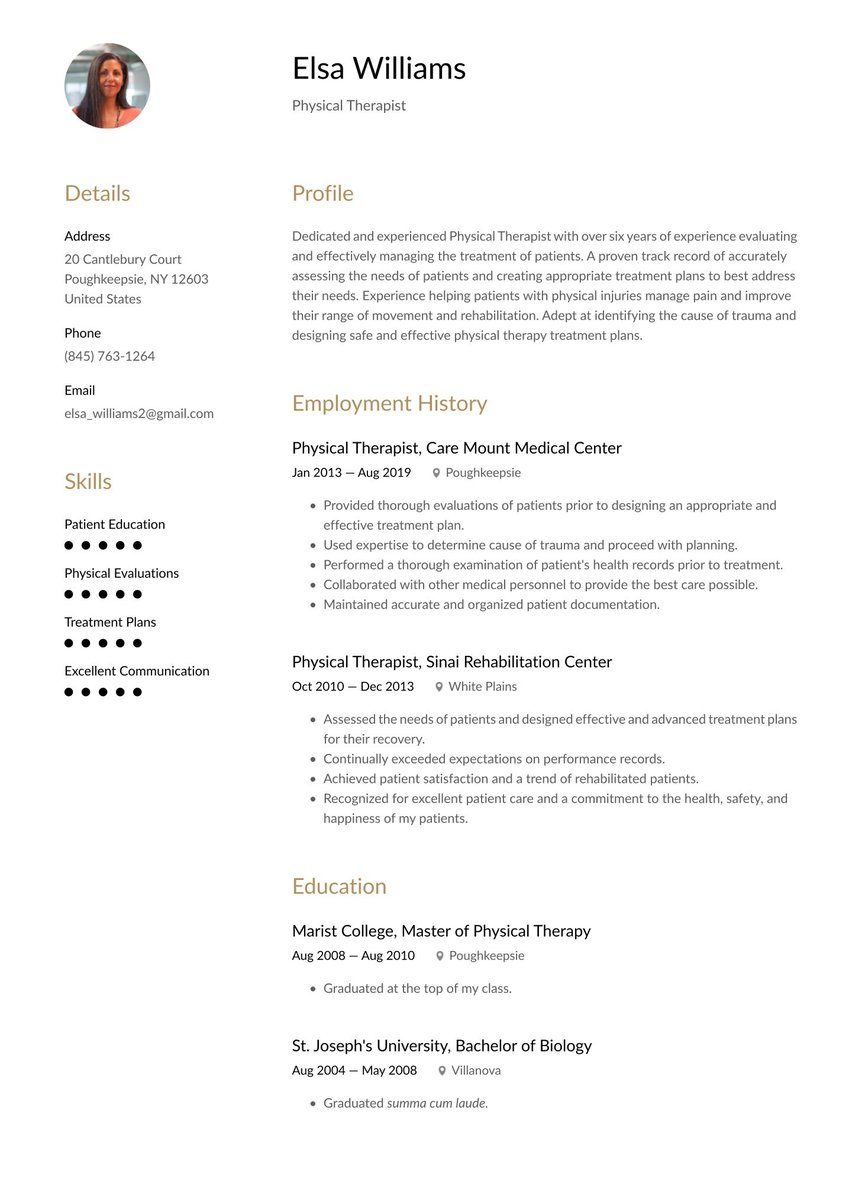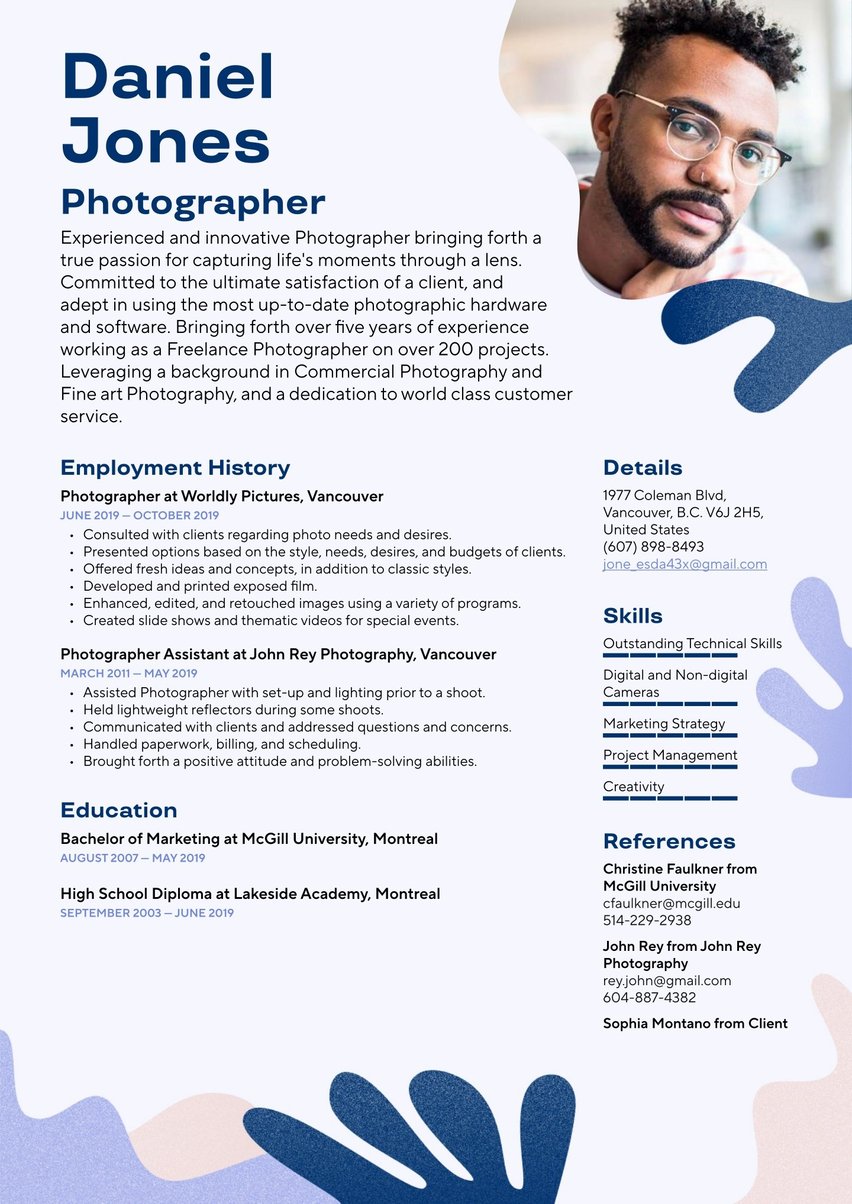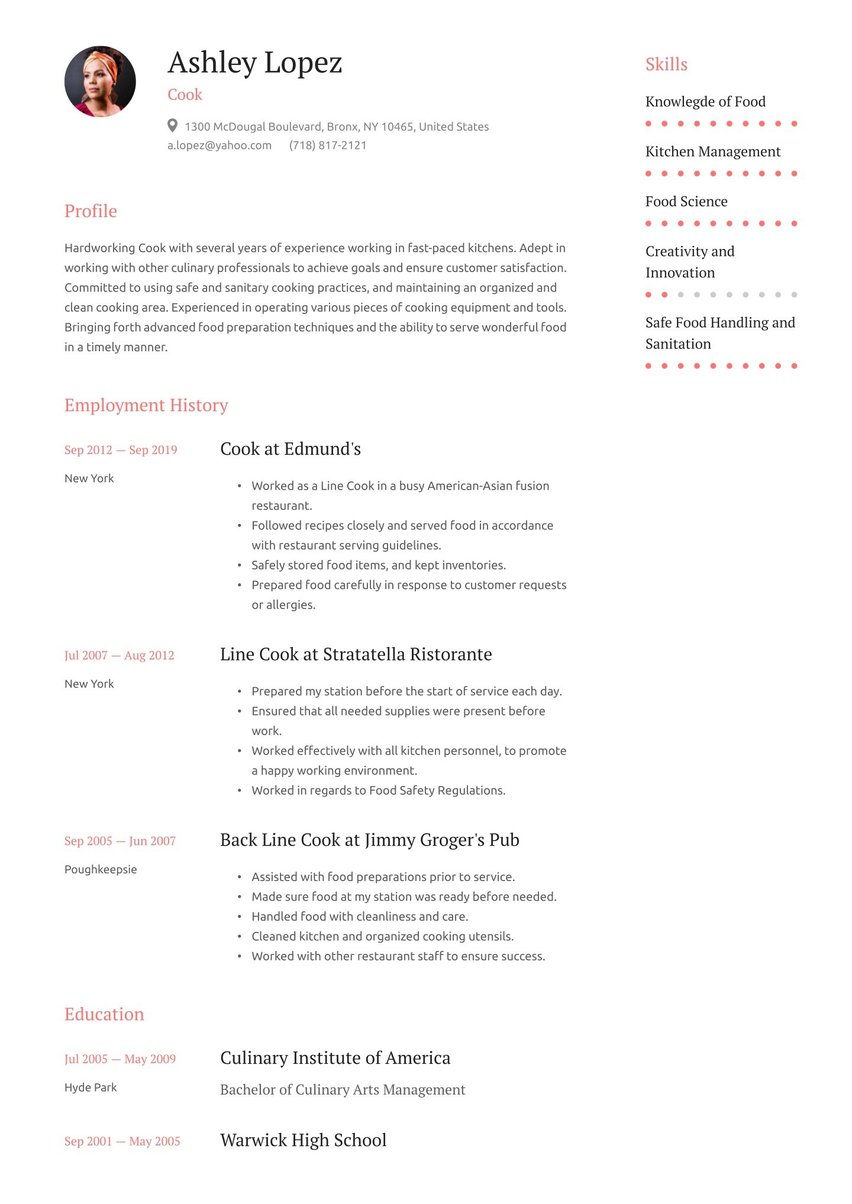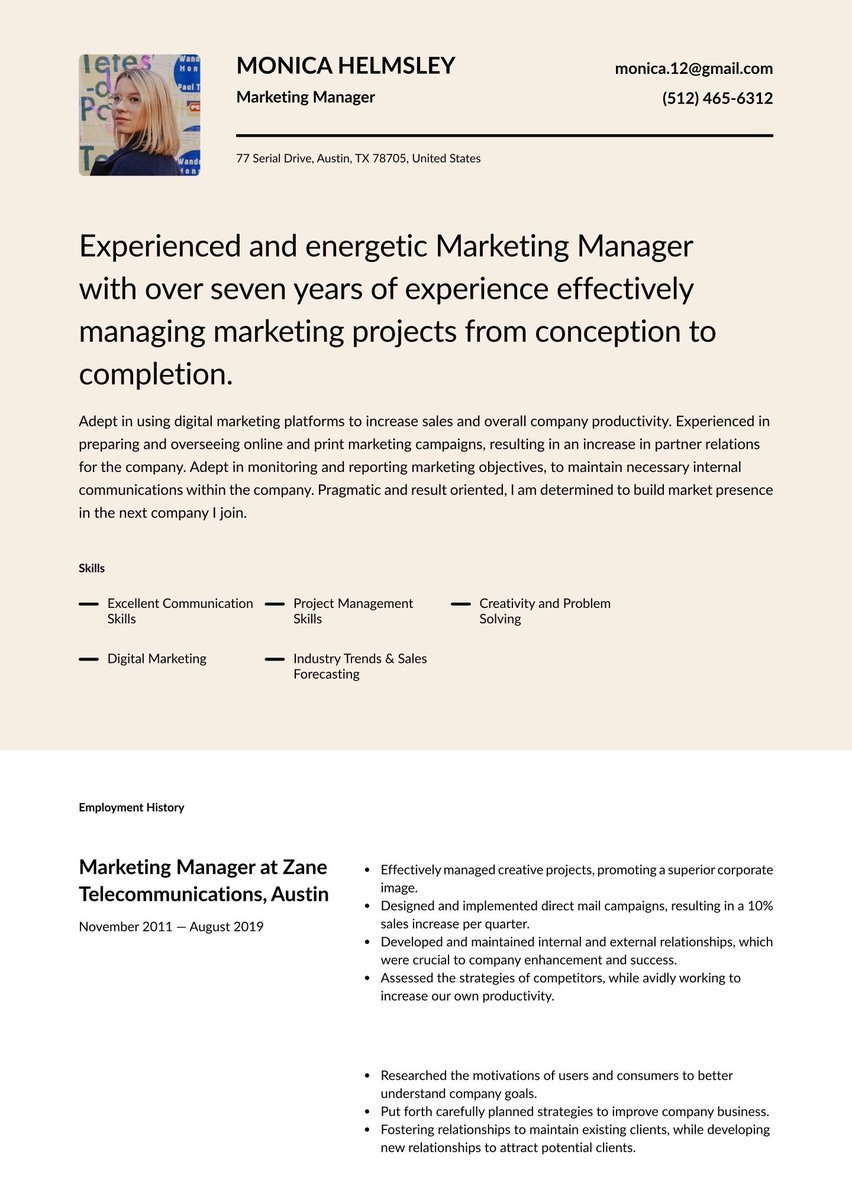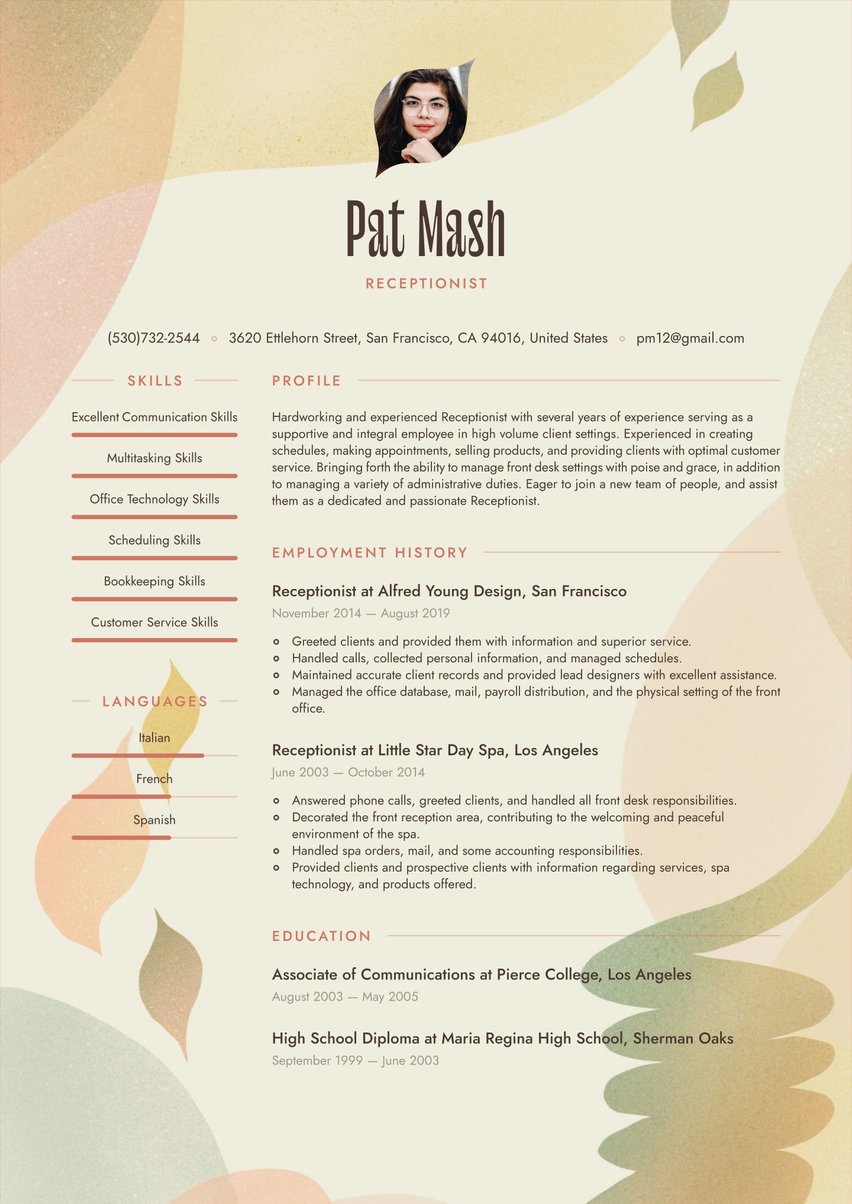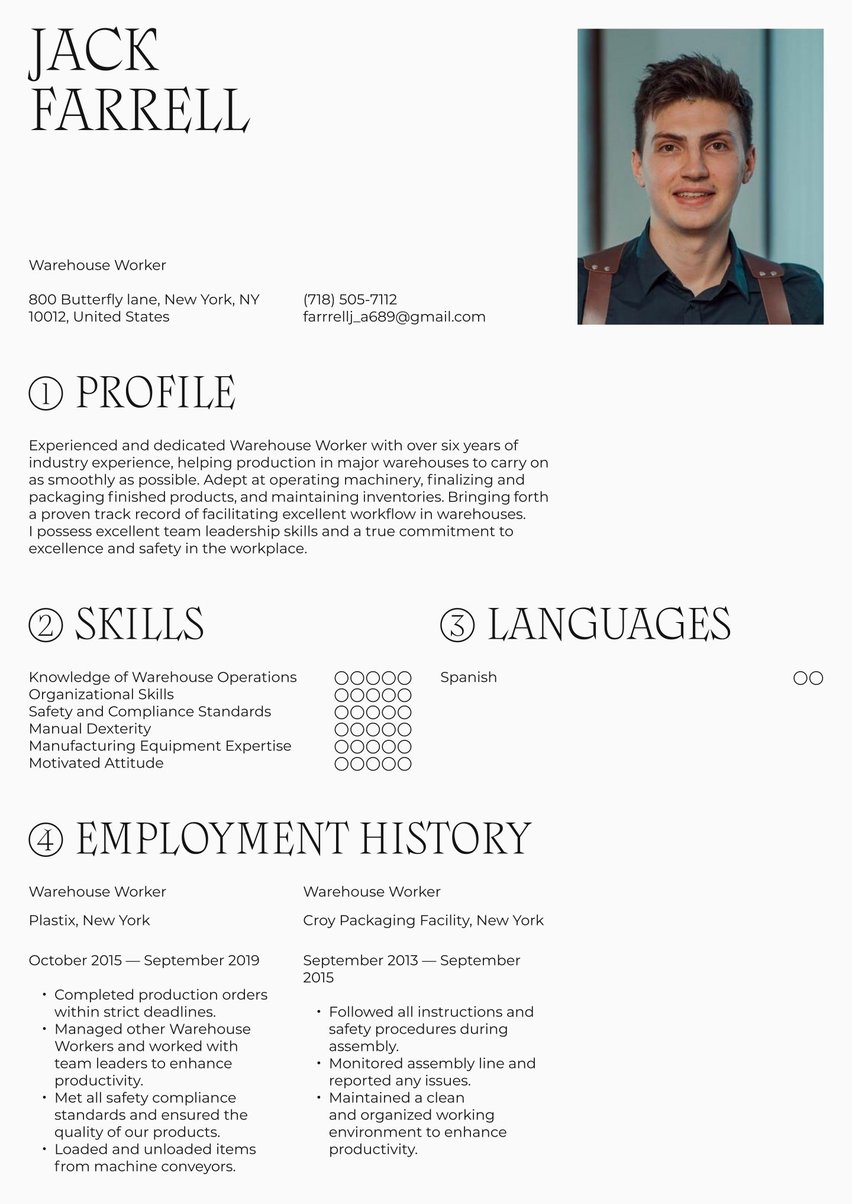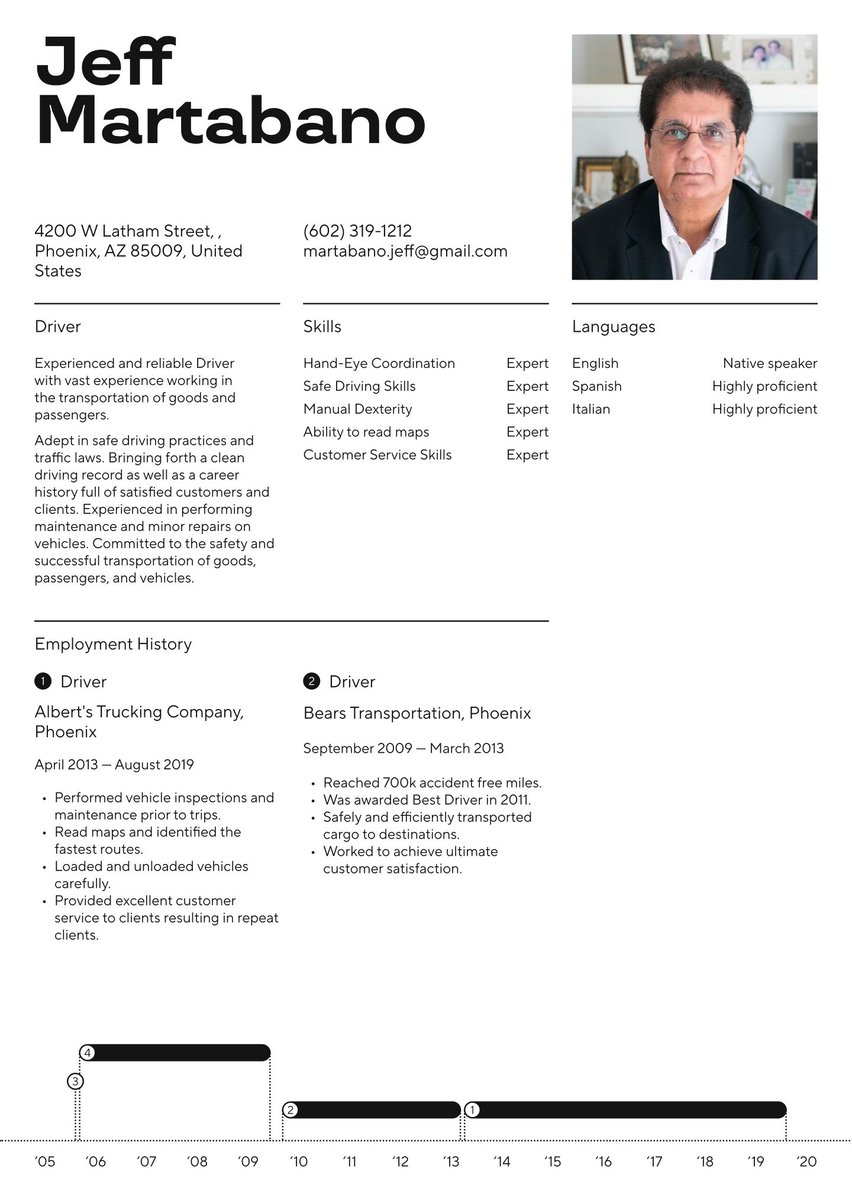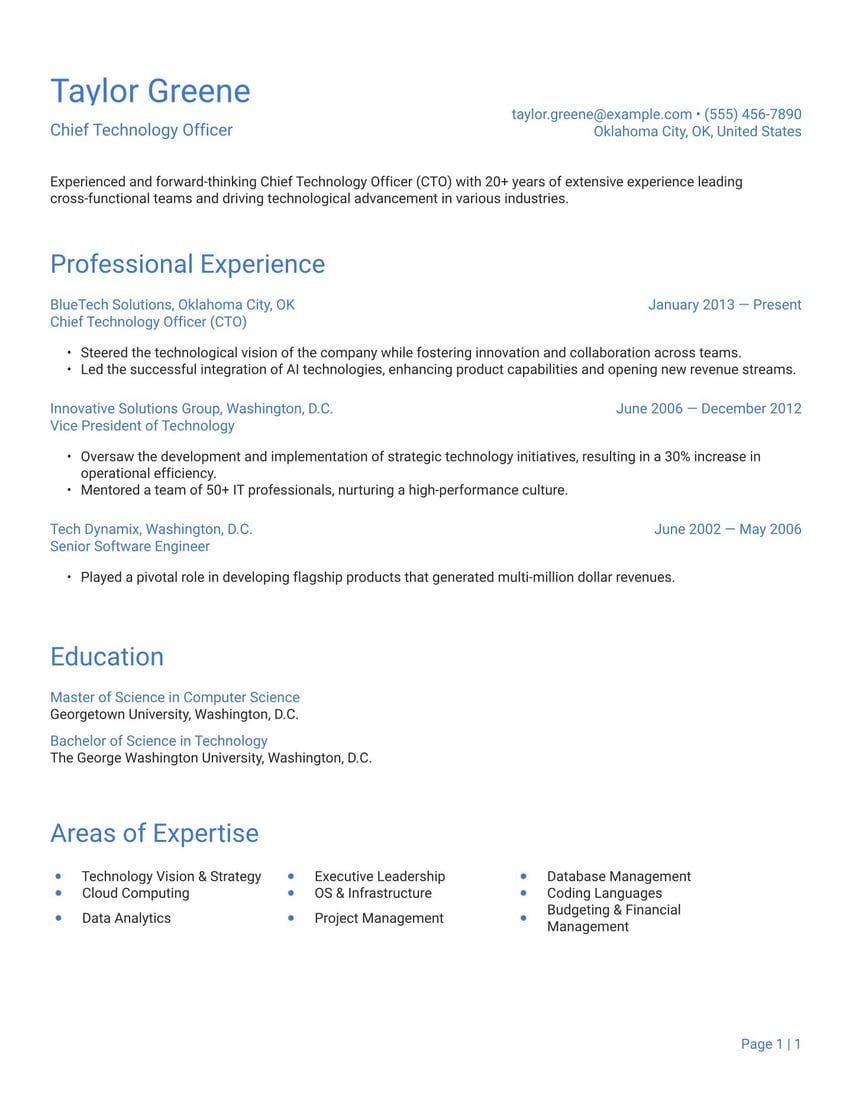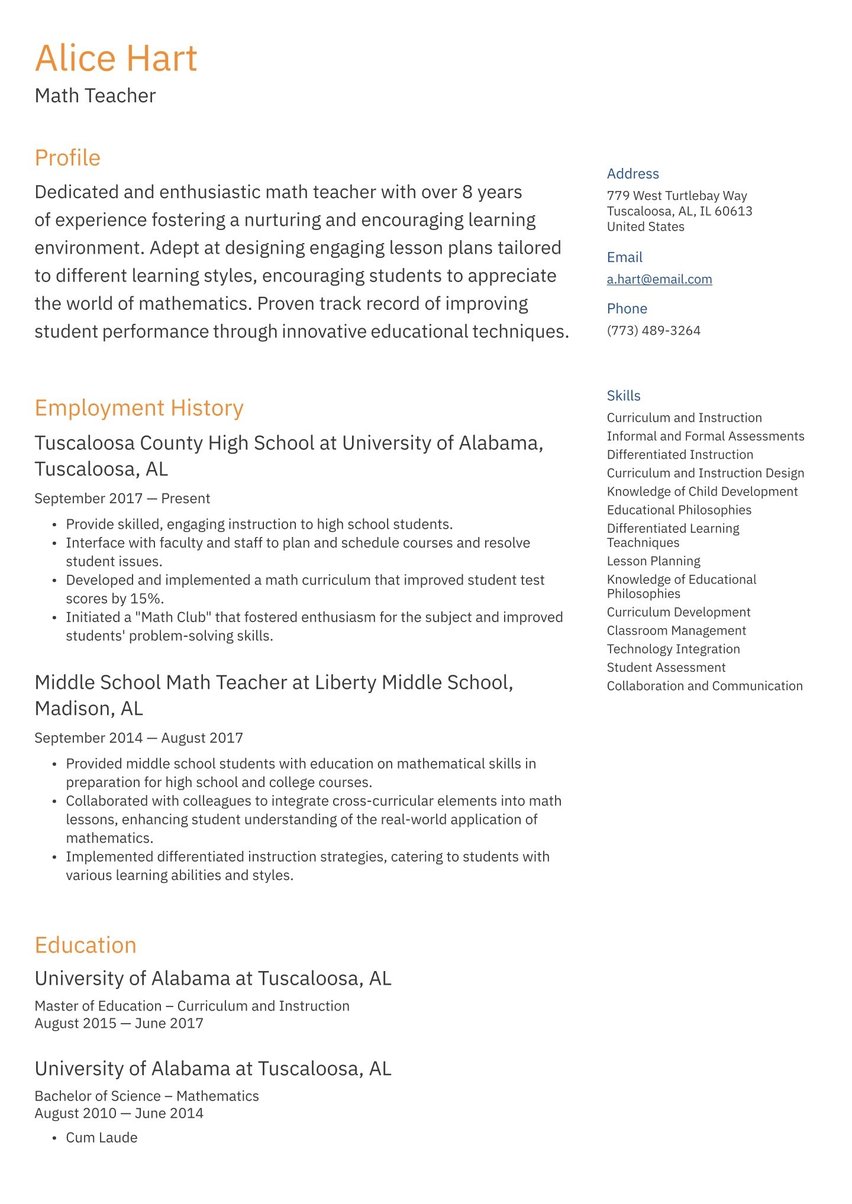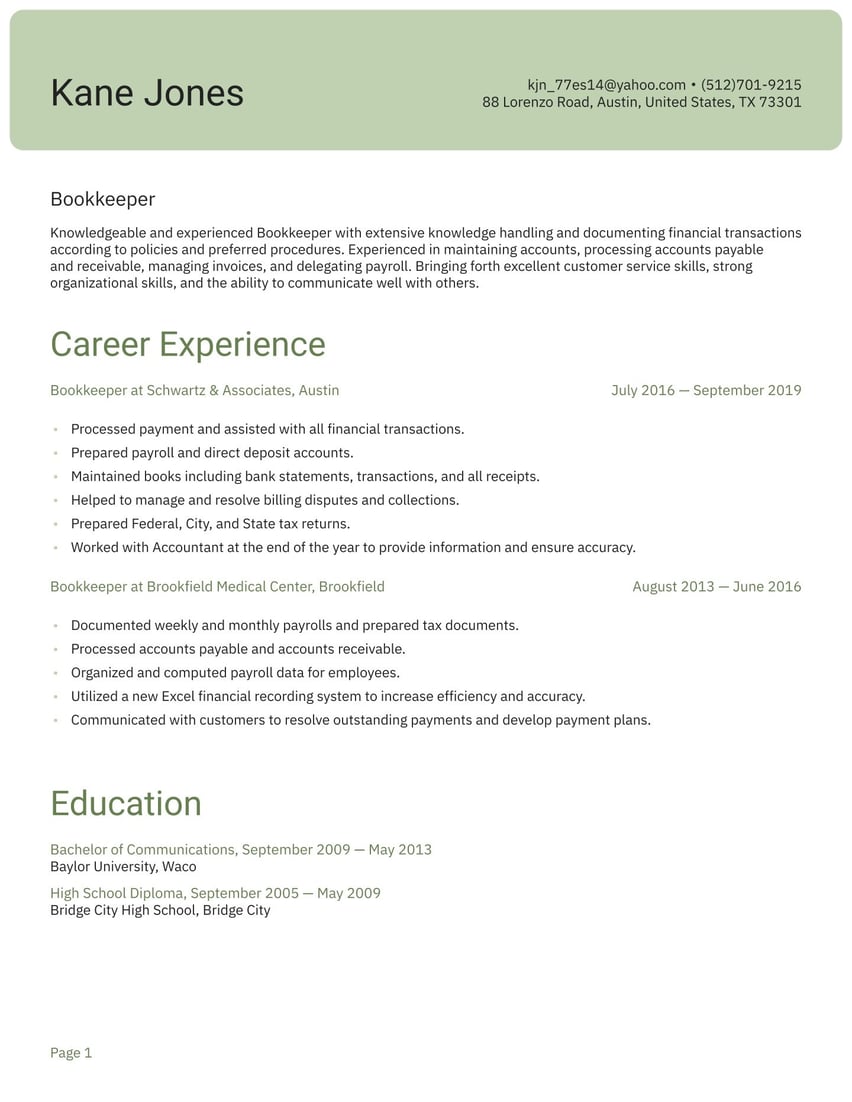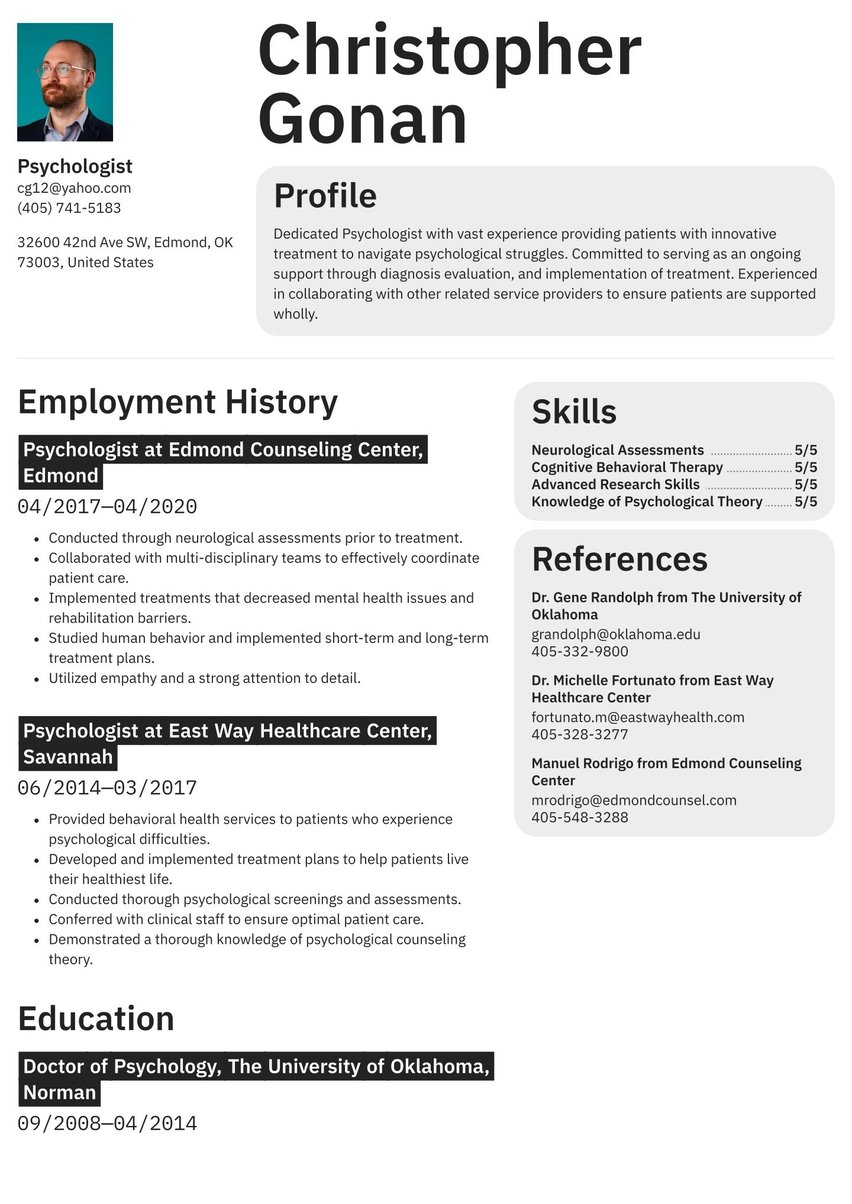Passionate physician with extensive experience in internal medicine and hospital settings. Adept in properly diagnosing and strategizing for the best patient treatment plans.Empathetic and professional attitude, committed to providing patients with the best care possible. Experienced in counseling patients on preventative care and positive lifestyle changes. A strong leader who works well under pressure and with other medical professionals.
05/2013 - 09/2019, Physician, Internal Medicine, Mount Sinai Medical Group, New York
- Attained 18% reduction in surgeries by recommending alternative treatments in consultation with allied health professionals.
- Patient commendations for personalized care were consistent with average 92% satisfaction scores in follow-up surveys
- Trusting relationships with patients and families were a factor in improved treatment compliance rates.
- Led department team for implementing electronic medical records and billing software, ahead of schedule and under budget.
09/2008 - 04/2013, General Internist, Mount Sinai Medical Group, New York
- Maintained the largest internist caseload of adult and pediatric clients during prolonged period of medical staff shortages
- Collaborated with nursing and administrative staff to reduce supply costs by 18%.
- Oversaw project to streamline communications with laboratory staff, reducing test result wait times by 8%.Positive relationships with medical colleagues in neighboring healthcare facilities helped boost patient referrals by 21%.
08/2005 - 05/2006, Doctor of Medicine, New York University, New York
08/2001 - 05/2005, Bachelor of Biology, Manhattan College, Bronx
- 3.9 GPA
- Strong Communication Skills
- Best Medicine Practices
- Preventative Care
- Quality Assurance
- Diagnosis and Treatment
While doctors can set a broken bone, diagnose a rare skin disease or even operate on a brain, they tend to be quietly competent professionals and not big self-promoters. Yet intelligent self-promotion — notably, a superior doctor resume — is precisely what they need to find the job that’s right for them. Medical school teaches how to diagnose exotic illnesses, but it doesn’t teach how to write a resume.
Doctor resume examples by experience level
That’s where Resume.io can help with a prescription for success. We don’t peer into people’s ears or palpate their abdomens, but we are experts at providing job search tools and advice for all kinds of professionals. Our online resources include more than 350 occupation-specific writing guides, matched with resume examples.
This writing guide, along with a doctor resume example, will provide everything you need to build a winning resume to help you land the right medical position for you. Our objectives here are to help you:
- Craft a doctor resume that stands out from the competition, taking today's job market into account
- Showcase your strengths in a way that optimizes each section of your resume: header, summary, employment history, education and skills
- Avoid the pitfalls of automated systems that can filter out your resume
- Make document layout and design decisions that are best suited to your doctor resume.
What does a doctor do?
Medicine is one of the world’s most coveted, highest-paying and respectable professions, and there are good reasons for that. Doctors are life savers, and we trust them to safeguard our most precious asset, our health. There is perhaps no field that requires so many years of study and on-the-job training. And so it’s eminently fair that doctors are well remunerated.
Understanding the medical job market
The job outlook for doctors of all kinds is good, but some specialists have an advantage. Doctors will always be in demand, though some specialties will be needed more than others. The Bureau of Labor Statistics (BLS) forecasts that the number of U.S. doctors’ jobs will grow by 3% between 2020 and 2030, slower than the overall job market average.
There were 727,000 U.S. doctor’s jobs in 2020, and there are expected to be 24,800 more by 2030. Demand for health care is expected to grow because the population is both growing and aging. Almost all new medical school graduates are offered residencies upon graduating — an advantage that many fields don’t share.
The BLS projects these medical specializations to experience the following rates of percentage growth in the U.S. between 2020 and 2030:
- Psychiatrists 13%
- Family and general practitioners 5%
- Physicians and surgeons, all other; and ophthalmologists, except pediatric 5%
- Anesthesiologists -1%
- Internists, general -1%
- Obstetricians and gynecologists -2%
- Pediatricians, general -2%
- Surgeons, except ophthalmologists -3%
Job prospects are expected to be especially good for specialists more in demand among an aging population, including cardiology, radiology and other specialties that treat chronic disease. And physicians willing to work in low-income and rural areas will have more options open to them, as most doctors gravitate toward higher-income urban areas. New technologies may also affect medical employment, as improved information technology and artificial intelligence reduce doctors’ workloads. Yet doctors will always be needed to manage patient care, and in fact new technologies should allow doctors to cover more ground and treat more patients more effectively.
Doctors also can expect top remuneration, among the highest of all professions. Median pay for U.S. doctors in 2020 was at least $208,000 per year, roughly $100 an hour.
These were the average wages for medical specialties in the U.S. in 2020:
- Anesthesiologists $271,440
- Surgeons $251,650
- Obstetricians and gynecologists $239,120
- Physicians and surgeons, all other $218,850
- Psychiatrists $217,100
- Family and general practitioners $214,370
- Internists, general $210,960
- Pediatricians, general $184,570
How to write a doctor resume
The anatomy of a doctor resume is virtually the same as for all occupations, comprising these essential parts:
- The resume header
- The resume summary
- The employment history section
- The education section
- The skills section
Economy of words is critically important to ensure your resume fits on a single page — concise and precise language that avoids repetition. For the same reason, you must be scrupulously selective about what information to include or omit.
We’ll take a closer look at each resume component later on.
Bear in mind that a resume is not a cast on a broken arm — it’s supposed to be flexible. Not all employers are created equal, and your resume should not be carved into stone. Target each employer that interests you, and tailor your resume to appeal to the talents and qualifications that each employer is seeking.
This last point can’t be emphasized enough, as it is often the key difference between a resume that was ignored and one that led to an interview. Remember that you’re not trying to convince anyone that you deserve a job — you are demonstrating that you have the specific skills your target employer is looking for.
And don’t forget the basics: A good resume for a doctor should demonstrate your ability to diagnose and treat illness, manage patient care and establish good relationships with patients. You must demonstrate that you possess a superior knowledge of anatomy, pathology and wellness, and that you are an expert in both hard science and soft skills.
Check out these other resume examples and writing guides in the medical field for more ideas and inspiration:
- Psychologist resume example
- Audiologist resume example
- Respiratory therapist resume example
- Child psychologist resume sample
- Medical support assistant resume example
- Medical social worker resume sample
- Physician assistant resume sample
- Clinic coordinator resume example
- Optometrist resume sample
- Physical therapist resume example
- Pharmacist resume example
- Dentist resume sample
- Sonographer resume sample
- Nurse resume example
- Psychotherapist resume example
- Medical science liaison resume sample
- Paramedic resume sample
The ATS: First, do no harm
Applicant Tracking Systems (ATS) are automated systems that process resumes in search of keywords input by hiring managers to designate requirements they are seeking. In medical professions, these could be abbreviations for necessary certifications, or they may include critical skills and qualities. If these don’t appear anywhere in your resume, it could be rejected before a human being even looks at it.
In technical or scientific professions, it’s especially important to pay attention to the phrasing/wording used in the job application, as professional abbreviations and terminology may vary slightly from state to state (or even country to country if you’re going overseas). Make sure to use the language used in the job listing (within reason of course) to pass the ATS software ranking.
To figure out what these crucial keywords are, study job listings to see what the job requirements are. Use these same keywords in your resume, using the same wording, and your resume is likely to be greenlighted by the ATS rather than deep-sixed.
Choosing the best resume format for a doctor
The most commonly used chronological format will be suitable for the majority of doctor resumes, and is preferred by recruiters. That means your professional experience is listed under employer headings, in order from most recent to earliest positions.
But if your career is in an early stage, or your experience is more varied — perhaps you have worked independently in consulting positions or held multiple positions simultaneously — there are other options for structuring your resume. The functional format allows you to put more emphasis on skills, types of specialized experience or even projects, rather than employee positions. A hybrid resume format is even more adaptable, combining chronological and functional elements.
Should you list your education or your job experience first? That depends on which rung of the ladder you’re currently climbing. If you have years of experience in medical practice, by all means list that first. But if you just got your M.D. from Harvard or Oxford, this will probably get recruiters’ attention more than a first-year residency at a little-known hospital, so you might want to mention this first.
As always, the name of the game is the vitally important practice of custom tailoring your resume for each specific situation and considering how your concrete data will be viewed by an impartial stranger.
Resume header: Distinguish yourself
A distinctively eye-pleasing header sets your resume apart from the rest at first glance. Prominently displaying your name, occupation and contact information also makes it easier for recruiters to follow up when they’re ready to get serious.
You will also not regret the small amount of extra effort it takes to create a visually matched pair of application documents that look inviting to read. Applying the same design elements to your cover letter and resume will first be noticeable in the headers.
Other helpful healthcare resume examples:
Doctor resume summary example: Tasteful self-promotion
The resume summary, also known as the profile or personal statement, is your best chance to make the case in your own words for being an outstanding hire. It’s what employers will see first on your resume — a succinct synopsis of yourself, your job aptitude and your professional interests. It's where you can describe your best qualities and put forth your best arguments for filling this medical position.
If you don’t get this right, hiring managers may swiftly lose interest and stop reading. Eye-tracking surveys have shown that hiring managers spend an average of six to eight seconds looking at a resume when deciding whether to keep reading, and they start at the top.
Lead with your strengths, control the narrative, and give your audience no reason to stop. This is not the place to be too modest. If you don’t tout your own credentials for the job, nobody else will. Be confident and be assertive without sounding arrogant.
The profile is also where you can choose to state specifically what kind of job you’re seeking. If you’re looking to move from a hospital to a private practice or vice versa, or looking for a shift in your specialization or responsibilities, this is the place to say so.
The Association of American Medical Colleges lists 15 core competencies the ideal medical student should possess:
Pre-professional competencies
- Service orientation
- Social skills
- Cultural competence
- Teamwork
- Oral communication
- Ethical responsibility to self and others
- Reliability and dependability
- Resilience and adaptability
- Capacity for improvement
Science competencies
- Living systems
- Human behavior
Thinking and reasoning competencies
- Critical thinking
- Quantitative reasoning
- Scientific inquiry
- Written communication
Below is a doctor resume example summary you can customize.
Passionate doctor with extensive experience in internal medicine and hospital settings. Adept in properly diagnosing and strategizing for the best patient treatment plans. Empathetic and professional attitude, committed to providing patients with the best care possible. Experienced in counseling patients on preventative care and positive lifestyle changes. A strong leader who works well under pressure and with other medical professionals.
Employment history sample: Your hands-on experience
Dynamic language — primarily strong action verbs — are the hallmark of an impressive work experience overview.Use strong action verbs to highlight the job history that best showcases your training and experience.
What you choose to list in this resume section, as bullet points organized under employer headings, will naturally depend on your career stage. Whether you are a long-established medical practitioner or just recently completed residency or fellowship training, the need to be selective still applies. The deciding factor is always the same: specify your work experience that is most directly relevant to the position you are seeking.
In any case, the descriptive highlights listed here should be framed as accomplishments rather than generic job duties. Avoid saying what you were responsible for and report what you actually did. Emphasize positive outcomes in measurable terms wherever possible, citing facts and figures to highlight project goals achieved, improvements, challenges you overcame, and so on.
Below is a doctor’s employment history resume sample you can modify.
Physician, Internal Medicine at Mount Sinai Medical Group, New York
May 2013 - September 2021
- Attained 18% reduction in surgeries by recommending alternative treatments in consultation with allied health professionals.
- Patient commendations for personalized care were consistent with average 92% satisfaction scores in follow-up surveys
- Trusting relationships with patients and families were a factor in improved treatment compliance rates.
- Led department team for implementing electronic medical records and billing software, ahead of schedule and under budget.
General Internist at Mount Sinai Medical Group, New York
September 2008 - April 2013
- Maintained the largest internist caseload of adult and pediatric clients during a prolonged period of medical staff shortages.
- Collaborated with nursing and administrative staff to reduce supply costs by 18%.
- Oversaw project to streamline communications with laboratory staff, reducing test result wait times by 8%.
- Positive relationships with medical colleagues in neighboring healthcare facilities helped boost patient referrals by 21%.
Doctor resume education example: Beyond naming your medical school
Your education is critical to your job search, and you need to present it in the manner that hiring managers expect in this resume section You can become a tech billionaire without finishing college, but you can’t become a doctor without finishing medical school. Education is a crucial component of any doctor’s background, as is on-the-job training in a residency.
To become a doctor, you need an undergraduate university degree (four years), followed by a medical degree (four more years) — that’s eight years already, and you’re hardly done yet. Most doctors then follow a residency path that can last anywhere from three to seven years.
By contrast, a master’s degree usually takes two years of postgraduate study, a law degree usually takes three, and a Ph.D. generally requires four. None of these requires a post-doctoral practicum, as medicine does. Doctors are doctors for a reason. Also, physicians are required to be licensed, with requirements varying by jurisdiction. Doctors must pass a standardized licensure exam, and in addition many seek certification by a medical board. In most cases, licensing and certification should be mentioned on your resume, and Resume.io's builder tool can help you determine where.
Can you major in poetry and still become a doctor? Sure … but! Here are the most common undergraduate degrees among more than 50,000 candidates who applied for medical school by submitting scores on the Medical College Admission Test, according to the Association of American Medical Colleges:
- Biological sciences: 11,843
- Other: 3,843
- Physical sciences: 2,214
- Social sciences: 2,107
- Humanities: 797
- Specialized health sciences: 650
- Math and statistics: 168
If the bullet points under your job history are scant, it’s not a bad idea to find some under your education history. You don’t want to submit a three-page resume, but a half-page resume may be even worse.
Did you work as a physician’s assistant while in medical school? Finish your undergraduate education with an impressive GPA? Volunteer at hospitals or clinics? Any of these could serve as bullet points that help boost your chances of landing the position you want.
Typically, the education section is also where awards, honors or special recognitions are listed. If it’s a relatively long list, a separate subsection with the heading "Honors" may be created.
Below is the education section from a doctor resume you can modify.
Doctor of Medicine, New York University, New York
August 2005 - May 2006
Bachelor of Biology, Manhattan College, Bronx
August 2001 - May 2005
- 3.9 GPA
Resident Physician, Mount Sinai Medical Group, New York
August 2006 - August 2008
Board certified, Medical Board of New York
2008
Resume skills example: How do you stand out?
Among several job candidates with the same qualifications, what makes you better? An intriguing resume summary and impressive employment and education sections give you a great start. But what if another candidate has is equally worthy on those counts?
The summary and skills sections are sort of like resume bookends that allow you to boast a bit about what you’re good at. Do you have exceptional medical expertise in a specialized field? Do you speak a foreign language that would enable you to communicate with patients who don’t speak English? Are you an outstanding communicator who can help patients understand their medical issues, as well as interact effectively with colleagues? Any of these could give you an edge — again, based on relevance to the job requirements.
According to the Bureau of Labor Statistics, these are the most important qualities sought in physicians and surgeons:
- Communication skills
- Compassion
- Detail-oriented
- Dexterity
- Leadership skills
- Organizational skills
- Patience
- Physical stamina
- Problem-solving skills
Check out a doctor CV sample for the skills section below.
- Strong Communication Skills
- Best Medicine Practices
- Preventative Care
- Quality Assurance
- Diagnosis and Treatment
Resume layout and design: Looks matter
A clean, crisp and streamlined layout and design are vital to any doctor’s resume. You wouldn’t usher patients into a cluttered, dirty exam room, and your resume should reflect the same attention to detail as your practice. Well organized, balanced and inviting to read. Clean, coherent, clear, concise. Attractive but simple. Elegant but not over-decorated. Clean, clear, bug-free design is essential to any doctor’s resume. You wouldn’t usher patients into a cluttered, dirty exam room, and your resume should reflect the same attention to detail as your practice. Clean, coherent, clear, concise. Attractive but simple. Elegant but not over-decorated.
Every formatting choice should have the same objective — enhanced legibility. From fonts, margin widths and line spacing to overall white space and color splashes, reader-friendliness matters most.
Extra precautions are advisable if you use standard text editing software to create your resume. Formatting bugs can make parts of your document unreadable by the ATS if it’s submitted online. Saving the final version as a PDF is a recommended safeguard
the most reliable, hassle-free way to sidestep these risks is to use one of Resume.io’s field-tested resume templates. Choose from dozens of designs in our collection and customize with your own replacement using our easy-to-use builder.
Doctor text-only resume example
Profile
Passionate doctor with extensive experience in internal medicine and hospital settings. Adept in properly diagnosing and strategizing for the best patient treatment plans. Empathetic and professional attitude, committed to providing patients with the best care possible. Experienced in counseling patients on preventative care and positive lifestyle changes. A strong leader who works well under pressure and with other medical professionals.
Employment history
Physician, Internal Medicine at Mount Sinai Medical Group, New York
May 2013 - September 2021
- Attained 18% reduction in surgeries by recommending alternative treatments in consultation with allied health professionals.
- Patient commendations for personalized care were consistent with average 92% satisfaction scores in follow-up surveys
- Trusting relationships with patients and families were a factor in improved treatment compliance rates.
- Led department team for implementing electronic medical records and billing software, ahead of schedule and under budget.
General Internist at Mount Sinai Medical Group, New York
September 2008 - April 2013
- Maintained the largest internist caseload of adult and pediatric clients during a prolonged period of medical staff shortages.
- Collaborated with nursing and administrative staff to reduce supply costs by 18%.
- Oversaw project to streamline communications with laboratory staff, reducing test result wait times by 8%.
- Positive relationships with medical colleagues in neighboring healthcare facilities helped boost patient referrals by 21%.
Skills
- Strong Communication Skills
- Best Medicine Practices
- Preventative Care
- Quality Assurance
- Diagnosis and Treatment
Education
Doctor of Medicine, New York University, New York
August 2005 - May 2006
Bachelor of Biology, Manhattan College, Bronx
August 2001 - May 2005
- 3.9 GPA
Resident Physician, Mount Sinai Medical Group, New York
August 2006 - August 2008
Board certified, Medical Board of New York
2008
Key takeaways for a doctor resume
- The job market for doctors of all kinds is expected to remain strong, despite a slower growth rate than the occupational average. Some specializations will be far more in demand than others.
- It may be harder to become a surgeon than a psychiatrist — yet the highest job growth in medicine is expected to be among psychiatrists, and the least among surgeons.
- Competition for the best jobs may be intense, and they aren’t handed out by chance.
- Intelligent preparation and crafting a great resume can mean the difference between accepting the job you’re offered and getting the job you want.
- Doctor’s resumes must take into account the automated Applicant Tracking Systems that can reject an application before an employer even looks at it.
- Take into account what each prospective employer is seeking, and tailor your resume accordingly.
You’ll take no chances if you trust in the proven builder tool and field-tested templates at resume.io. Get started!


.jpg)

.jpg)
